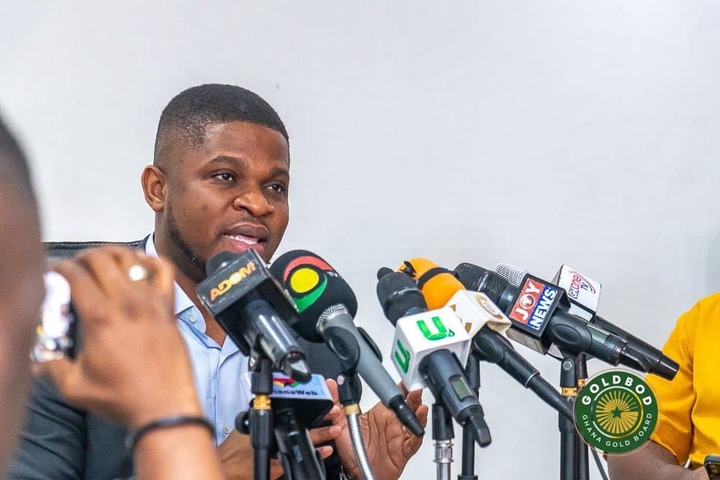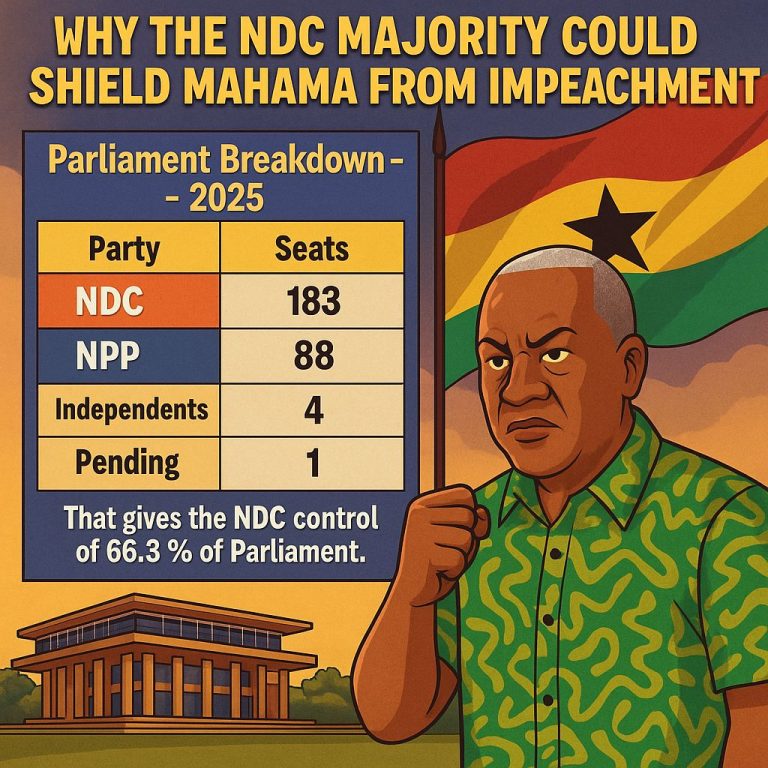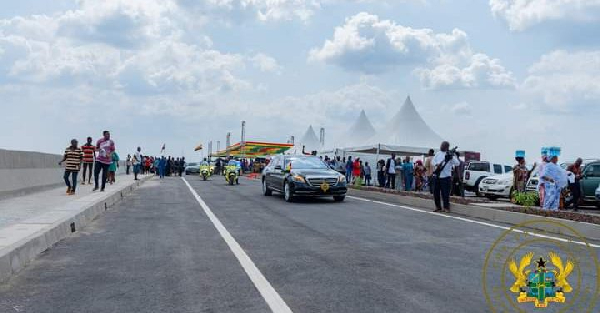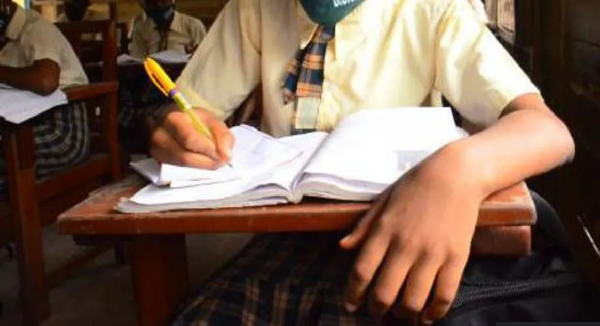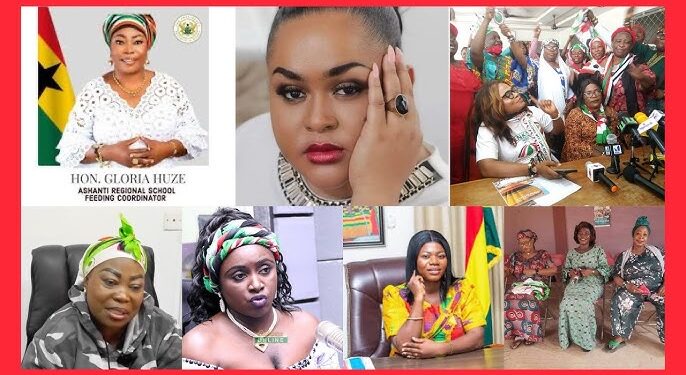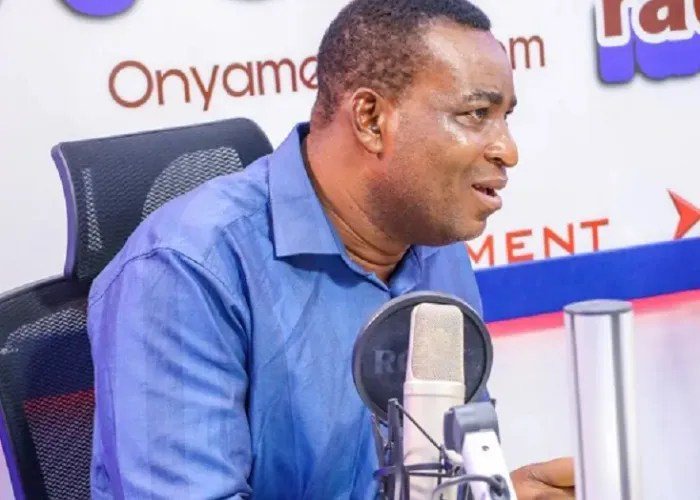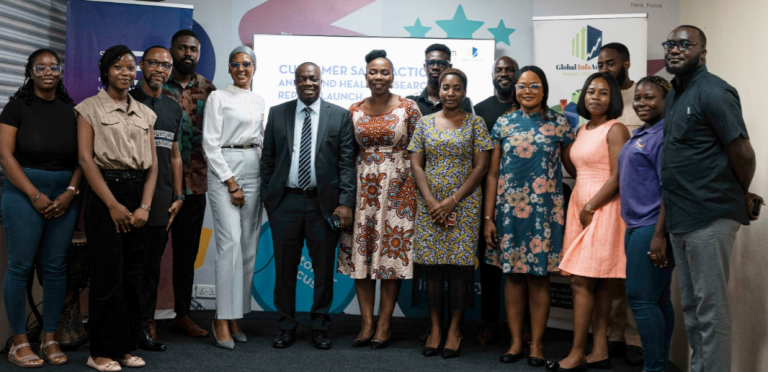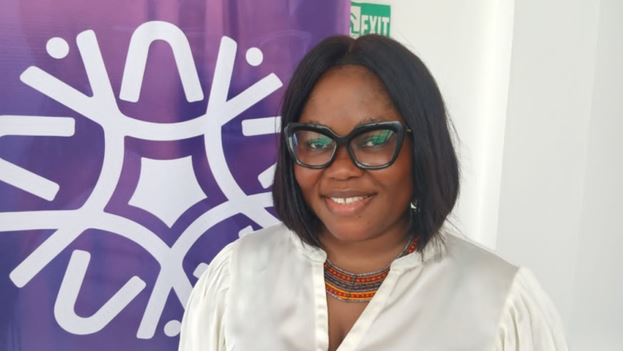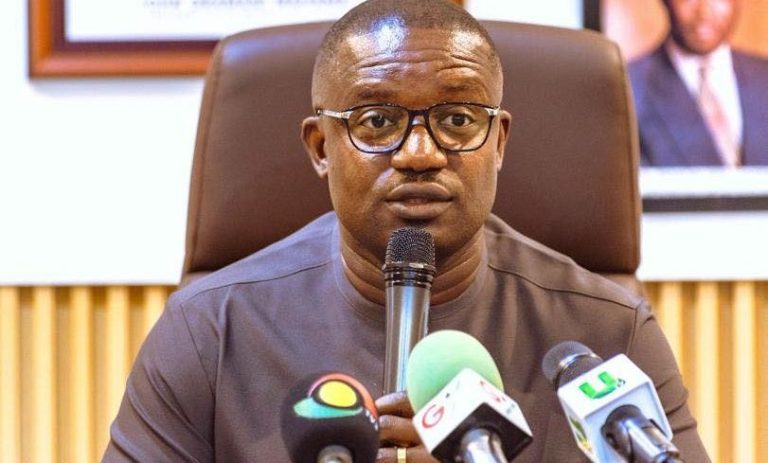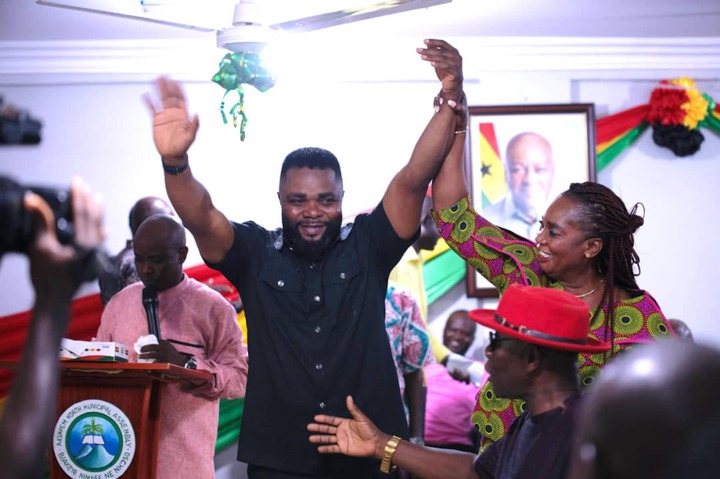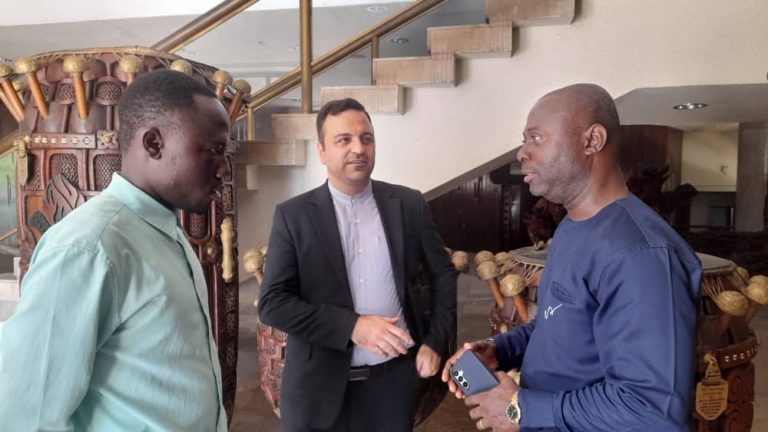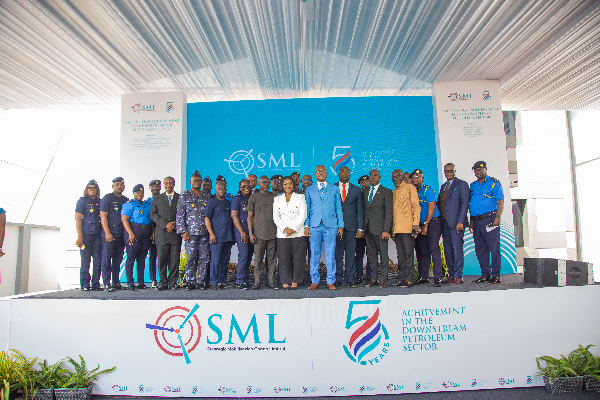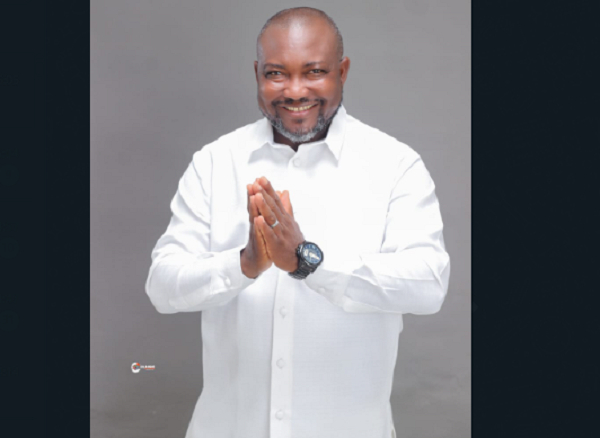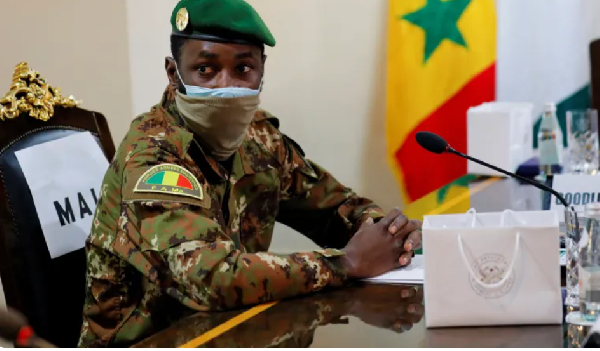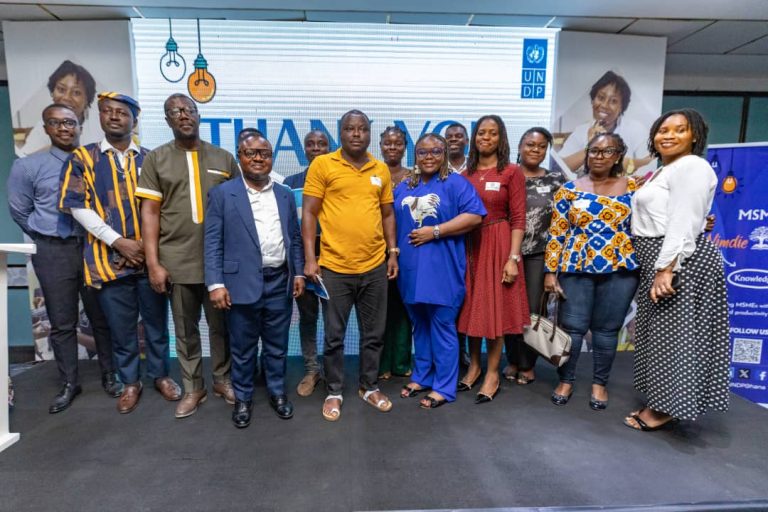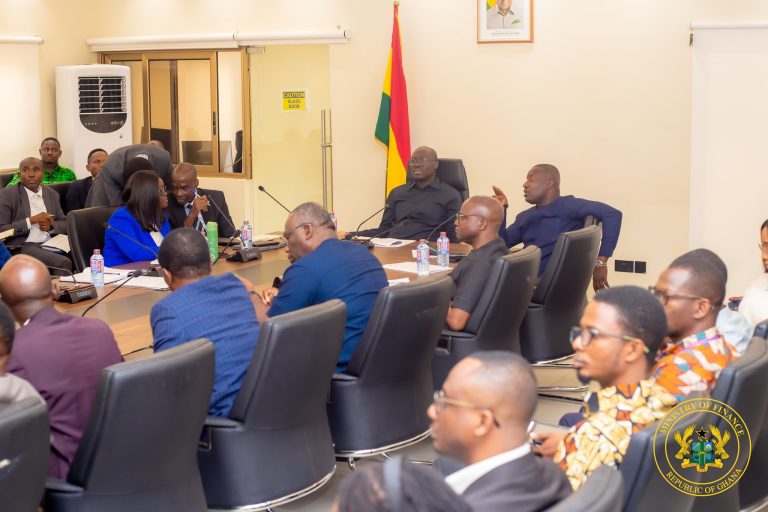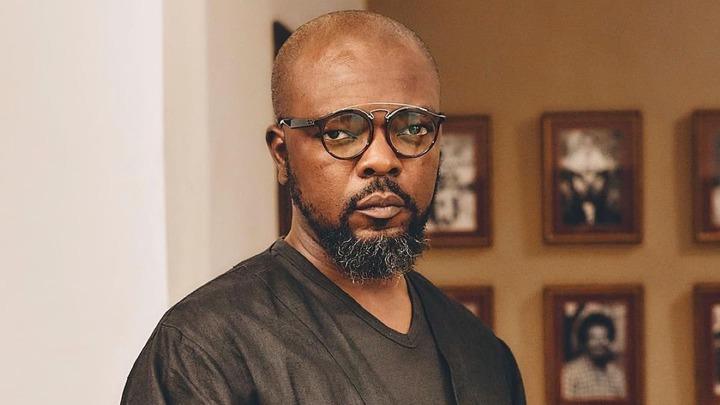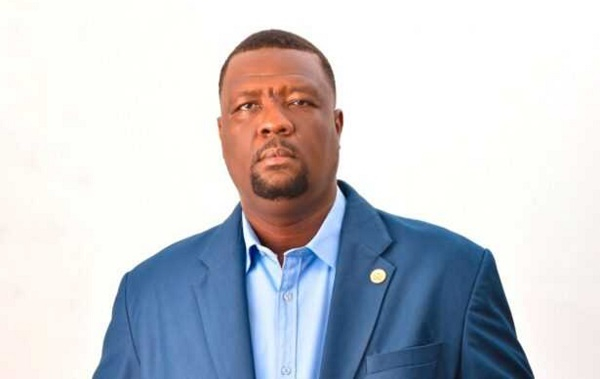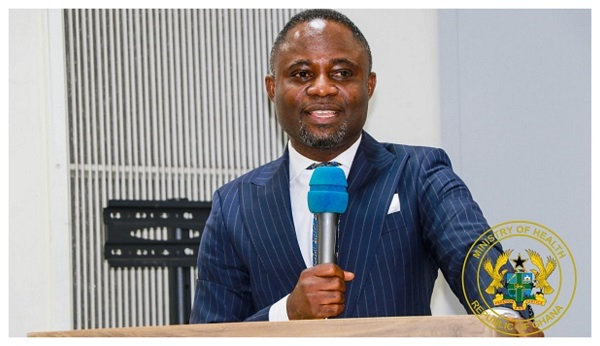The Criminal Investigation Department of the Ghana Police Service, Commission on Human Rights and Administrative Justice (CHRAJ) are set to look into the acting Chief Executive Officer (CEO) of Ghana Gold Board, for presenting a dollar-denominated gift to a Ghanaian pastor, Evangelist Patricia Oduro Koranteng.
This follows a petition filed by the Minority in Parliament to these institutions on Thursday, May 15. At the time of this article, there were reports of the Minority’s plan to also petition the Office
Minority runs to CID, CHRAJ, others to probe dollar donation by Sammy Gyamfi
Why the NDC majority shields Mahama from impeachment—even amid constitutional Concerns
As public debate intensifies around the President’s recent foreign travel while the Vice-President was reportedly unwell, questions of constitutional breach and impeachment have emerged.
But what does the law actually say—and can President Mahama be impeached?
The Legal Threshold for Impeachment
Article 69 of Ghana’s 1992 Constitution outlines the process:
A sitting President may be removed from office for:
• Violation of the Constitution,
• Stated misbehaviour, or
• Inability to perform functions of office.
If, as publicly indicated by the President himself, both the President and Vice-President were simultaneously outside the country, with the Vice-President receiving medical care and no formal Acting President appointed, this may constitute a breach of Article 60(8).
That provision requires the Vice-President to perform presidential functions in the President’s absence. Where both are unavailable, constitutional continuity demands that an Acting President be designated to maintain lawful executive authority.
Without such delegation, the state may be deemed to have been left without a functioning executive, raising concerns under Article 1(2), which declares that any act inconsistent with the Constitution is void.
Can Parliament Remove Him? The Maths Says No.
Impeachment is not merely legal—it is profoundly political. Here’s why:
• Parliament currently consists of 276 seats.
• Impeachment requires a two-thirds majority—184 votes.
• The NDC holds 183 seats. The NPP, 88. Independents, 4. One seat remains pending.
This means that unless every NDC MP breaks rank, and at least one Independent or NPP member joins them, impeachment is procedurally dead on arrival.
Speaker’s Role: Political Leverage or Constitutional Duty?
The Speaker of Parliament—Alban Bagbin—which some consider an NDC affiliate, plays a pivotal role. Article 69(2)(a) mandates that he must refer any notice of impeachment to the Chief Justice within 7 days.
However, speakers can delay through procedural objections or by questioning the admissibility of motions—creating tactical delays that weaken momentum.
An Acting Chief Justice—depending on their independence and procedural stance—would be constitutionally bound to establish a tribunal if the Speaker refers the matter. However, the real procedural gatekeeper remains the Speaker of Parliament, whose political alignment with the NDC could influence the pace and posture of any referral, making fast-tracking unlikely.
Judicial Oversight vs Political Will
Once the matter reaches the Chief Justice, the formation of a 5-member tribunal is mandatory. However, reaching that stage requires a compliant Speaker and a clean procedural motion—rare in politically charged climates.
Once the matter reaches the Chief Justice, the formation of a 5-member tribunal under Article 69(2)(b) is mandatory and largely procedural. The Chief Justice has no discretion to reject or delay this step once a valid referral has been made by the Speaker.
However, reaching that stage is where the constitutional machinery can be quietly obstructed—and this is where the Speaker becomes pivotal.
By “compliant Speaker,” we refer to a Speaker who objectively follows the Constitution’s mandate under Article 69(2)(a), which requires them to forward any impeachment notice to the Chief Justice within seven days. In practice, however, a Speaker—particularly one aligned with the ruling party, such as the current NDC Speaker—may:
• Question the admissibility or procedural form of the impeachment notice,
• Delay receipt or acknowledgement of the motion,
• Request revisions or further clarification from the initiators, or
• Discretely stifle momentum through parliamentary rules or timing strategies.
This sort of procedural “slow-walking” is often difficult to challenge legally, yet it can effectively derail impeachment efforts before they even begin—without violating the letter of the law.
The implication is significant: even if there is legal merit to an impeachment motion, and even if the one-third MP threshold is met, the Speaker’s role as gatekeeper means that the matter may never reach the tribunal stage. In such cases, constitutional accountability is subordinated to partisan loyalty and political calculus, eroding public confidence in Parliament’s neutrality as a constitutional check.
Constitutionally Possible. Politically Improbable.
The impeachment of President Mahama is legally plausible if the allegations regarding absence and executive vacuum are substantiated. But the NDC’s iron grip on Parliament, combined with institutional alignment and party loyalty, makes actual removal nearly impossible.
For the real battleground is not in Parliament—but in public discourse, judicial interpretation, and civic pressure. In the coming weeks, watch not just for legal filings, but for how the public narrative is shaped.
The real battleground is no longer Parliament—where party-line voting makes constitutional accountability nearly impossible. Instead, it has shifted to the court of public opinion, the interpretive power of the judiciary, and the collective voice of civil society.
In high-stakes constitutional disputes such as this, the law is only one terrain. Equally important is the narrative—how the public perceives what has occurred, and whether institutions are seen to be acting in good faith. If the Speaker delays referral, or the executive appears to bypass constitutional checks, the onus may fall on civic watchdogs, legal commentators, and the media to frame the issue for national consciousness.
Moreover, the judiciary’s role becomes magnified—not just to resolve legal ambiguity, but to restore constitutional clarity in a moment that threatens to destabilize institutional trust. Public pressure, amplified through strategic litigation, social mobilization, and civic education, may be the only effective tool left to demand accountability when the formal parliamentary route is procedurally locked.
So in the coming weeks, do not look only for writs and rulings. Watch how the nation reacts. Watch how the story is told. Because ultimately, constitutional order survives not only through law—but through collective vigilance.
A Watershed Moment, or the Beginning of a Constitutional Unraveling?
This moment is not isolated—it is the latest domino in a chain reaction that threatens the very architecture of Ghana’s constitutional democracy.
It began when the then-opposition NPP challenged the Speaker’s declaration of a de-facto NDC majority, prompting judicial review of a matter long understood to be political, not legal. The Supreme Court—then under NPP-appointed leadership—intervened in a parliamentary procedural ruling, raising early alarms about the judiciary’s neutrality in political contests.
Fast forward to the NDC’s return to power: the judiciary is now facing its own internal reckoning. The sitting Chief Justice is suspended, and a removal process has been initiated under a government that previously objected to judicial overreach.
An Acting Chief Justice is now in place, casting a long procedural shadow over any pending constitutional references, especially those that might relate to presidential conduct or separation of powers.
Now, the opposition—ironically the same NPP that once invoked the Court to check Parliament—is considering impeachment proceedings against President Mahama for allegedly breaching the Constitution while abroad.
These are not isolated events. Together, they represent the systemic erosion of the separation of powers—with each arm of government weaponizing its authority depending on who holds political power.
What does this mean for Ghana?
Ghana stands at a constitutional inflection point.
The traditional guardrails—judicial independence, parliamentary autonomy, and executive restraint—are being hollowed out by partisan calculation. The precedent being set is dangerous: that constitutional boundaries are flexible, dependent on electoral outcomes, and reversible depending on who sits in the chair.
If this trend continues, future Chief Justices will be suspended at political convenience. Speakers will be challenged for their rulings by whichever party is out of power, and Presidents will either override or be overridden, depending on which faction dominates the court of the day.
This is not merely an institutional crisis—it is the slow corrosion of constitutional culture.
The Real Danger: No More Separation of Powers
If left unchecked, Ghana may be headed for a permanent collapse of institutional independence, where no branch of government truly checks the other. Instead, we will see rotating invasions—each new majority using the Constitution as a tool of conquest, rather than a restraint on power.
What we are witnessing may be a watershed moment, yes. But if the nation does not course-correct, it will become an eternal moment—one in which the idea of checks and balances ceases to exist.
Final Word
Constitutionalism is not sustained by laws alone, but by restraint, tradition, and mutual respect among institutions. The real test is not what each branch can do, but what it chooses not to do.
Because once all three branches forget their boundaries, it’s not just the Constitution that collapses—it’s the Republic that follows.
Amanda Clinton is a Ghanaian lawyer, legal commentator, and Founding Partner of The Law Office of Clinton Consultancy. She has advised across constitutional, commercial, and international law matters and frequently contributes to national discourse on legal and governance issues.
By Amanda Clinton, Legal Analyst & Managing Partner, Clinton Consultancy.
MSc. In African Politics (SOAS, London)
DISCLAIMER: The Views, Comments, Opinions, Contributions and Statements made by Readers and Contributors on this platform do not necessarily represent the views or policy of Multimedia Group Limited.
DISCLAIMER: The Views, Comments, Opinions, Contributions and Statements made by Readers and Contributors on this platform do not necessarily represent the views or policy of Multimedia Group Limited.
Avoid over speeding to maintain Ashaiman-Afienya road
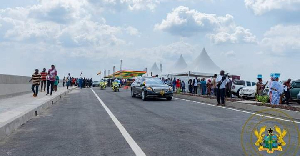 This photo shows the road when it was being commissioned in 2024
This photo shows the road when it was being commissioned in 2024
The Ashaiman-Afienya Road has undergone a significant renovation, bringing relief to commuters who have long experienced its poor condition.
Contractors working on the stretch from the Ashaiman Roundabout to Afienya have urged motorists to strictly adhere to speed limits following the completion of maintenance work aimed at easing traffic congestion along the route.
This rehabilitation project was designed to improve connectivity and reduce travel times, and it has been welcomed by both residents and drivers.
The upgrade was initiated following a directive from Kwame Governs Agbodza, the Minister of Roads and Highways, who ordered the road to be made more navigable.
Contractors from Oswal Investment Limited quickly mobilised to handle the renovations, completing the project in just six weeks.
“Prior to the maintenance works, the road was debilitating, and now that we have improved it, we are going to enhance the driver comfort, and so you are likely to have drivers go beyond the speed limit on the stretch,” Project engineer, Kennedy Acquah, said.
He further noted that all maintenance activities were carried out during the night to minimise disruptions to daytime traffic.
“Like I always say, there is one side of it that is us developing the road, and there is the other side where drivers would also have to conform to the speed limit,” Acquah added.
Engineers overseeing the project have warned drivers against speeding on the newly resurfaced road.
The improved road has been warmly received by residents and road users, many of whom previously faced long delays and vehicle damage due to the road’s poor condition.
“Previously, the road was in poor condition, but now it has been significantly improved, and this will benefit everyone. The government must be lauded for this,” a pedestrian shared, a report by citinewsroom.com stated.
Motorists have been encouraged to follow speed limits to prevent accidents and ensure the longevity of the roadway.
Another road user stated that; “The road used to be filled with potholes, causing frequent traffic congestion. It would also often flood during rainstorms. However, the road has been upgraded almost overnight, and these improvements will make a positive difference for all of us. The government has done a great job.”
According to the report, both authorities and contractors are now counting on responsible driving to ensure that the enhanced road serves its intended purpose and promotes road safety.
NAD/AE
Watch as Paul Adom Otchere offers advice to NDC footsoldiers
Quarter-ounce BoG gold coin selling at GH¢10,937.74 as of May 15
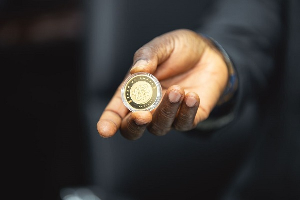 The introduction of the gold coin is to discourage the hoarding of dollars
The introduction of the gold coin is to discourage the hoarding of dollars
The Bank of Ghana’s gold coin has seen a consistent drop in its price for its investment following the appreciation of the cedi against the dollar.
The Central Bank introduced the coin as a strategic measure to discourage the hoarding of the US dollar.
As of May 15, 2025, the Bank reported the following updated prices:
– The 0.25 oz coin is now selling at GH¢10,937.14, down from GH¢11,134.38 on May 14.
– The 0.50 oz coin is priced at GH¢21,088.54, down from GH¢21,478.39.
– The 1.00 oz coin is selling for GH¢41,440.89, down from GH¢42,217.56.
According to the Central Bank, the initiative is designed to absorb excess liquidity in the market and help strengthen the Ghana cedi against major foreign currencies.
The Ghana Gold Coin is available in three denominations: one ounce, half-ounce, and quarter-ounce, and is being sold through commercial banks.
— Bank of Ghana (@thebankofghana) May 15, 2025
‘
SSD/AE
Blank questions, power cuts and a suicide: Nigeria’s exams fiasco
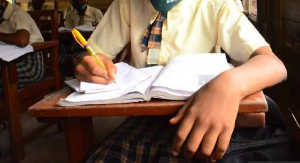 Most of the students who sat the exams scored less than 50% needed to get into university
Most of the students who sat the exams scored less than 50% needed to get into university
Her father and elder sister told the BBC that she had sat the exam for the second time and got 146 marks out of 400, lower than the 193 she had last year.
“The pain made her take her own life,” her father, Oluwafemi Opesusi, told BBC Pidgin.
Generally 200 or above out of 400 is enough to get a place in university in the exams run by the Joint Admissions and Matriculation Board (Jamb).
Only 400,000 of the 1.9 million students achieved that mark, one of the worst performances in recent years.
One student, Favour Eke, told BBC Igbo that 10 of the 165 questions didn’t appear on the screen – all she could see was the multiple choice options for the answers.
“We were told to omit the blank questions and continue the exam but it was very hard to concentrate after that,” she said.
She has also experienced technical problems getting her results, meaning she is very unlikely to get into university this year – the third time she has taken the exams.
She sat the test in the capital, Abuja, which is not one of the centres where students can retake their exams, leaving her completely distraught.
Another student said he had trouble logging in to the computer before someone else’s profile mysteriously appeared on the screen, showing different questions and then the machine briefly shut down completely.
“I did not get to answer all the questions when they told us our time was up because a lot of my time was wasted due to those technical difficulties,” he said.
The exams body has apologised for the “painful damage” and “the trauma that it has subjected affected Nigerians”.
In a press conference, Jamb registrar Ishaq Oloyede broke down in tears as he apologised.
He announced that almost 380,000 candidates in 157 affected centres from a total of 887, would be able to retake their exams starting from Saturday.
The zones that are most affected are Lagos and several states in the south-east.
Jamb blamed a failure of the computer system to upload exam responses by candidates in these areas during the first days of the exams.
It said an “unusual level of public concerns and loud complaints” had “prompted us to do an immediate audit or review”. Ordinarily, this would have happened in June, it said.
The national exam, known as the Unified Tertiary Matriculation Examination (UTME), is a computer-based test that is a requirement for those joining universities and other tertiary institutions.
The 2025 test, which was conducted in March, was marred by disruptions due to power outages in some areas.
The head of the exams body earlier this week defended the poor results, saying they reflected the “true academic abilities” of the students and were because of a clampdown on cheating.
Many Nigerians on social media have been calling for accountability, with some seeking Oloyede’s resignation.
Opposition figure Peter Obi said that while the admission of fault was commendable, the issue raised “a very concerning issue on glitches and the grave havoc” in critical institutions.
Rights activist Rinu Oduala said it was “incompetence. It’s educational sabotage. He should be arrested immediately.”
“I will cut off her hands” – NDC woman allegedly threatens Vivian Jill over school feeding contract
The information gathered alleged that popular Ghanaian actress Vivian Jill had been caught in an NDC row over a school feeding contract.
Reports suggest Vivian Jill has been threatened following being awarded a school feeding contractor in Ahafo Ano South Constituency of the Ashanti Region.
An audio recording circulating online alleged to be the voice of the National Women’s Organiser of the NDC threatened to cut off Vivian Jill’s hands if she came to fulfil the contract.
Wontumi accuses Mahama of rebranding Akufo-Addo’s Agyapa deal as GoldBod
Ashanti Regional Chairman of the New Patriotic Party (NPP), Bernard Antwi-Boasiako, has accused President John Mahama of reviving and rebranding the controversial Agyapa Royalties deal under a new name—GoldBod.
Speaking on Wontumi Morning Show, the NPP executive, popularly known as Chairman Wontumi, alleged that after the National Democratic Congress (NDC) strongly opposed the Agyapa initiative during Akufo-Addo’s administration, they have now adopted the same idea under a different name for their own political convenience.
Stratcomm Africa, Global InfoAnalytics launch Brand Health report
Strategic Communications Africa Ltd. (Stratcomm Africa) and Global InfoAnalytics have officially launched the *Customer Satisfaction and Brand Health Research Report*, marking a significant milestone in the use of data-driven insights for strategic business growth in Ghana.
Hosted at Stratcomm Africa’s headquarters in Accra, the launch brought together industry leaders, marketing professionals, business executives, and media representatives under the theme “Decoding Brand Perception of Businesses: Insights for Strategic Growth.”
The report, compiled by Global InfoAnalytics, provides a detailed assessment of brand performance and consumer perception, particularly within Ghana’s banking sector. It aims to serve as a powerful tool for business leaders seeking to align brand strategy with measurable customer sentiment and market expectations.
Speaking at the launch on Tuesday May 13, Esther A.N. Cobbah, CEO of Stratcomm Africa, emphasised the critical role of research in shaping brand success.
“You cannot guess what customers want—you need to find out from the data,” she stated. “Companies, including NGOs, sometimes make mistakes because they do not take time to understand the communities they serve.”
Mussa K. Dankwah, Executive Director of Global InfoAnalytics, highlighted the gap between marketing investments and customer perception.
“Perception is not always reality, but it shapes how people act,” he said. “With the right data, businesses can change a negative image into something better.”
The collaboration between Stratcomm Africa and Global InfoAnalytics brings together two industry leaders—one in creative communication and brand management, and the other in empirical research and data analytics. Their shared vision is to provide business intelligence that not only informs but transforms, leading to actionable strategies for sustainable growth and competitive advantage.
Sharon Anim, Marketing Communication Manager at Stratcomm Africa, opened the event with an engaging demonstration on brand perception, urging businesses to ask themselves: “What comes to mind when people hear our name?”
“The report we are unveiling today goes beyond data—it unlocks insight,” she said. “Because data without insight is like a drum with no rhythm—it makes noise but adds no value.”
The report’s launch is designed to establish it as a leading reference for brand perception and customer satisfaction in Ghana. It also reinforces the reputation of Stratcomm Africa and Global Info Analytics as trusted partners for businesses looking to ground their strategies in robust, evidence-based insights.
We require about $1.1 billion to procure liquid fuel alone
An amount of $1.1 billion is needed by the government to procure fuel to enable the country to keep its plants running.
The Minister for Energy and Green Transition, John Jinapor, revealed this information when he appeared before the Parliamentary Committee on Energy today.
“We require about $1.1 billion to procure liquid fuel alone. Unfortunately, the liquid fuel is not part of the tariff structure, and so we will be buying close to $15 billion of liquid fuel, and that has to be paid by the central government.”
Police provide official details on arrest of 29-year-old illegal trader of tramadol, narcotics
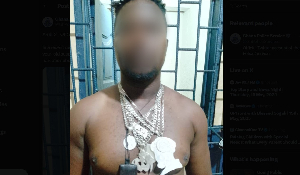 29-year-old Adam Mohamed was arrested for trading illegally in narcotics
29-year-old Adam Mohamed was arrested for trading illegally in narcotics
The Airport District Police Command has said it has arrested a 29-year-old suspect, Adam Mohamed, for his involvement in the illegal trade of narcotic substances.
According to the Ghana Police Service, the arrest took place on Saturday, May 10, 2025, at approximately 10:00 pm during a special police operation conducted at Aboabo No 1.
The operation was aimed at apprehending individuals engaged in narcotics trafficking within the area.
In a post on May 15, 2025, the GPS said “During the search, police retrieved the following items from the suspect:
•35 packs of 250mg Tramadol
•28 packs of 120mg Tramadol
•11 packs of 225mg Tramadol
•Approximately 50 empty cartons are used for packaging and transporting the drugs.”
It noted that additionally, an amount of sixty-six thousand nine hundred and fifty Ghana Cedis (GH¢66,950.00) was discovered in the suspect’s room.
“The cash is believed to be proceeds from the sale of the illicit drugs and has been retrieved for evidential purposes,” the police said.
ARREST OF SUSPECT FOR DEALING IN NARCOTIC SUBSTANCES
In a recent development, the Airport District Police Command has arrested a 29-year-old suspect, Adam Mohamed, for his involvement in the illegal trade of narcotic substances. pic.twitter.com/X7xKBpOjrd
— Ghana Police Service (@GhPoliceService) May 15, 2025
SSD/AE
Ghana To Host First U-20 WAFU A&B Boys Cup
GHANA IS set to host the maiden edition of the U-20 WAFU A&B Boys Cup from June 15 to 30, 2025, bringing together all 16 West African nations for a landmark youth football tournament.
The announcement follows Ghana’s successful staging of the CAF African Schools Football Championship in April at the University of Ghana Stadium.
Participating countries include Cape Verde, The Gambia, Guinea Bissau, Guinea, Mali, Liberia, Mauritania, Senegal, Sierra Leone, Benin, Burkina Faso, Côte d’Ivoire, Niger, Nigeria, Togo, and host nation Ghana.
This will be the first time both WAFU A and B zones are unified in a single U-20 competition, building on previous zonal tournaments that doubled as qualifiers for the CAF U-20 Africa Cup of Nations.
Matches will be played at the Ghanaman Soccer Centre of Excellence in Prampram, with the final scheduled for the University of Ghana Stadium in Accra.
The tournament aims to enhance youth development and competition across the region, offering young talents increased exposure and experience at a high level of continental football.
If I were the president I would fire Sammy Gyamfi- Kennedy Agyapong
Top member of the New Patriotic Party and former Member of Parliament for Assin Central, Hon. Kennedy Agyapong has broken his silence on the Agradaa- Sammy Gyamfi saga.
The loudmouth politician joined other NPP bigwigs at the Central University earlier today, May 14 to have a pep talk as well engage with the students over there, and in his speech, decided to add his cent to the trending topic.
Diddy trial live: Cassie Ventura testifies in Sean Combs sex-trafficking case
Diddy’s lawyer asks Cassie about relationship with hip-hop mogulpublished at 15:02 British Summer Time
 Madeline Halpert
Madeline Halpert
Reporting from court
After about 45 minutes of debate between lawyers over evidence issues, Cassie Ventura is back on the stand – wearing a black blazer and white shirt, and her hair is in a ponytail.
Sean “Diddy” Combs’ lawyer Anna Estevao is questioning her.
So far, her line of questioning is what we expected.
Estevao asks Ventura about the more loving sides of their relationship.
“You were in love with him for 11 years, right?” she asks.
Ventura pushes back where she can, disputing the framing that she “kept coming back” to Combs over and over.
We are also seeing hints of the defence’s argument that infidelity and jealousy fueled their fights.
Estevao reads back Ventura’s testimony from yesterday in which she said she was “insanely jealous” in their relationship.
The defence is moving quickly with their yes or no questions, so we could get through a lot this morning, though prosecutors are lodging many objections.
President John Mahama will be another Nkrumah
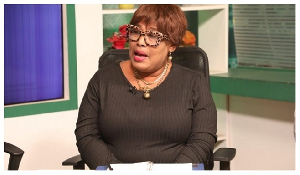 Nana Yaa Jantuah is a presidential staffer who believes Mahama could be the next Nkrumah
Nana Yaa Jantuah is a presidential staffer who believes Mahama could be the next Nkrumah
Presidential Staffer, Nana Yaa Jantuah, has expressed her optimism and confidence in the leadership of President John Dramani Mahama, stating her belief in his ability to transform the country.
In a video shared by JoyNews on Thursday, May 15, 2025, Nana Yaa Jantuah stated that President John Dramani Mahama’s administration and style of governance are on the right track.
The politician, who is also a leading member of the Convention People’s Party (CPP), further stated that based on the actions taken by President Mahama and his government just a few months into their administration, she envisions that he has the potential to emulate the legacy of Dr Kwame Nkrumah — Ghana’s founding father — who is widely celebrated as a transformational leader and the architect of the nation’s independence.
Jantuah acknowledged that as a mortal being, the president is bound to make some mistakes and may occasionally take decisions that may not sit well with the populace.
However, she urged Ghanaians to exercise patience and give him the space to govern in the best interest of the nation, reiterating her strong belief that he has the vision and capability to transform the country.
“… John Dramani Mahama is on the right track. He will be another Nkrumah that we are wishing to see. Yes, of course, he’s a human being, but we should give him time. We shouldn’t cloud and crowd him out so much. We should give him time, and we’ll see what Ghana will become,” she said.
MAG/AE
Watch as Paul Adom Otchere offers advice to NDC footsoldiers
‘If I don’t sack you, I will be sacked’
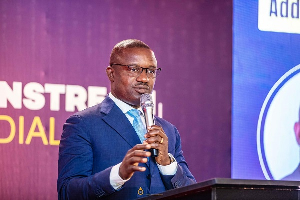 John Jinapor is the Minister of Energy and Green Transition
John Jinapor is the Minister of Energy and Green Transition
The Minister of Energy and Green Transition, John Jinapor, has issued a stern warning to administrative officers within the energy sector, stating that underperformance or attempts to sabotage operations will not be tolerated.
Speaking at a briefing with members of the Energy Committee of Parliament and Cabinet on Thursday, May 15, Jinapor emphasized that any official found to be negligent or obstructive will be dismissed from their post, regardless of their rank.
“I’m serious about this. If we find out that any administrative officer—be it Director, General Manager, Area Manager—is not working in line with the laid-down procedures, or is either lazying around or sabotaging the system, you will be sacked,” he cautioned.
He added, “If I don’t sack you, I’ll be sacked. So I want to appeal to the Chairman and the Committee members, so we can all work together.”
The Minister also shed light on the financial strain facing the energy sector, revealing that the government inherited more than GH¢3 billion in outstanding payments owed to power generation companies.
He explained that this is part of a much larger sector-wide debt, which previously stood at around GH¢80 billion.
However, he noted that the recent appreciation of the Ghana cedi has contributed to a slight reduction in the overall debt burden, most of which is denominated in foreign currencies such as the US dollar.
Jinapor’s remarks underscore the government’s commitment to improving operational efficiency and financial sustainability within the energy sector, amid growing concerns over reliability and debt accumulation.
Watch as Paul Adom Otchere offers advice to NDC footsoldiers
Egypt vs Morocco (U20 AFCON semi-finals)
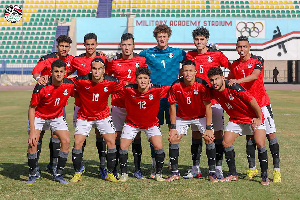 Egypt U20 team defeated Ghana on penalties to qualify to the semi-finals of the AFCON
Egypt U20 team defeated Ghana on penalties to qualify to the semi-finals of the AFCON
The host nation, Egypt, will take on Morocco in the semi-finals of the U20 African Cup of Nations (AFCON) on May 15, 2025.
Egypt began their campaign with a narrow 1-0 victory over South Africa but were later stunned by a 4-1 defeat to Sierra Leone, with Momoh Kamara netting a hat-trick in a dominant display.
Following that reality check, Egypt managed only a goalless draw against Zambia before narrowly edging Tanzania 1-0 in their final Group A match to secure a spot in the quarterfinals, where they beat Ghana on penalties after a 2-2 draw.
Like Egypt, Morocco got off to a strong start with a 3-2 win over Kenya, followed by a goalless draw against Nigeria, and capped their Group B campaign with an impressive 3-1 triumph over Tunisia.
The Young Atlas Lions scraped past Sierra Leone in the quarterfinal, needing an own goal from Amara Keita to secure their place in the semi-finals.
Both teams are aiming to clinch the trophy, which makes the game intense.
Watch the match below:
SB/MA
South Africa’s Ramaphosa to meet Trump in US next week amid rising tensions
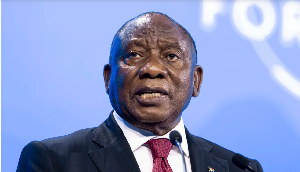 Cyril Ramaphosa is the South African President
Cyril Ramaphosa is the South African President
South African President Cyril Ramaphosa will meet United States President Donald Trump at the White House next week in an attempt to “reset” ties between the two countries, Pretoria has said.
The reported visit comes after the US welcomed dozens of white Afrikaners as refugees this week, following widely discredited allegations made by Trump that “genocide” is being committed against white farmers in the majority-Black country.
“President Ramaphosa will meet with President Donald Trump at the White House in Washington, DC to discuss bilateral, regional and global issues of interest,” South Africa’s presidency said in a statement on Wednesday.
“The president’s visit to the US provides a platform to reset the strategic relationship between the two countries,” it added, saying the trip will take place from Monday to Thursday and the two leaders will meet on Wednesday.
The White House had no immediate comment on the meeting, which would be Trump’s first with the leader of an African nation since he returned to office in January.
Relations between Pretoria and Washington have soured significantly since Trump returned to the White House.
Trump has criticised Ramaphosa’s government on multiple fronts. In February, he issued an executive order cutting all US funding to South Africa, citing disapproval of its land reform policy and its genocide case at the International Court of Justice (ICJ) against US ally Israel.
‘Wrong end of the stick’
Trump’s order also offered to take in and resettle people from the minority Afrikaner community, whom he alleges are being persecuted and killed because of their race – claims that have been disproven by experts and South Africa’s government.
Afrikaners are descendants of mainly Dutch colonisers who led the apartheid regime for nearly five decades.
Pretoria maintains there is no evidence of persecution of white people in the country and Ramaphosa has said the US government “has got the wrong end of the stick”, as South Africa suffers overall with the problem of violent crime, regardless of race.
The US’s criticism also appears to focus on South Africa’s affirmative action laws that advance opportunities for the majority-Black population, who were oppressed and disenfranchised under apartheid.
A new land expropriation law gives the government power to take land in the public interest without compensation in exceptional circumstances. Although Pretoria says the law is not a confiscation tool and refers to unused land that can be redistributed for the public good, some Afrikaner groups say it could allow their land to be redistributed to some of the country’s Black majority.
According to data, white people, who make up about 7 percent of South Africa’s population, own more than 70 percent of the land and occupy most top management positions in the country.
Ramaphosa has spoken repeatedly of his desire to engage with Trump diplomatically and improve the relationship between the two countries.
The US is South Africa’s second-largest bilateral trading partner after China.
Prepare for opportunities – Seasoned leadership Professional to youth
The founder of the Ennobled Foundation and seasoned leadership and development professional, Gloria Boye-Doku, has urged young people to take charge of their future by preparing for opportunities before they arise.
Speaking at a youth empowerment event themed “Invisible to Influential: Career Marketing Strategies”, she emphasised that preparation is the key to unlocking future success.
She encouraged young people to be proactive in building relevant skills, staying informed about emerging trends, and cultivating a growth mindset to position themselves for transformative opportunities.
“Opportunities rarely come with warnings. If you’re not prepared, you’ll miss them. Now is the time to invest in yourself, read, learn, grow, and stay ready,” she stressed.
Her message resonated deeply with the audience, which included students, entrepreneurs, and young professionals seeking guidance on career development and personal growth.
The Ennobled Foundation is a youth-focused non-profit organisation dedicated to developing ethical, empowered, and visionary young leaders.
Through mentorship programmes, leadership training, and capacity-building workshops, the foundation aims to bridge the gap between potential and opportunity.
Since its inception, the Ennobled Foundation has made a significant impact across various communities by equipping young people with the confidence, skills, and mindset needed to thrive in today’s world.
Razak Simpson is arguably the best player on the Ghana scene- Kennedy Boakye Ansah
Nations Football Club brands manager Kennedy Boakye Ansah has made a bold claim that Nations FC defender Razak Simpson is arguably the best player on the Ghana scene.
He made the huge claim in an exclusive chat with Citi Sports when talking about the chances of the Kumasi based club winning what would be its maiden Ghana Premier League (GPL) title.
With four games left to be played in the 2024-2025 GPL season, Nations have 54 points and hold a one point lead over second ranked Bibiani Gold Stars.
Simpson, whose string of impressive performances have led to multiple call ups to the Black Stars, has been one of the standout players for Nations FC and Kennedy Boakye Ansah believes that the team’s captain is arguably the best player on the Ghanaian scene.
“He has proven that he is arguably the best player on the local scene and once he was given an opportunity to play for the Black Stars, we all saw the stuff that he is made of.”
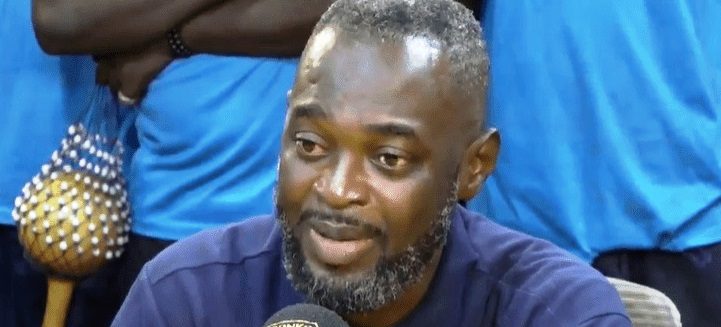
“We believe that being in the business of football, we should be able to develop talents not just for Nations FC but we should be able to develop talents that will be extremely beneficial to our national team course” Boakye Ansah said.
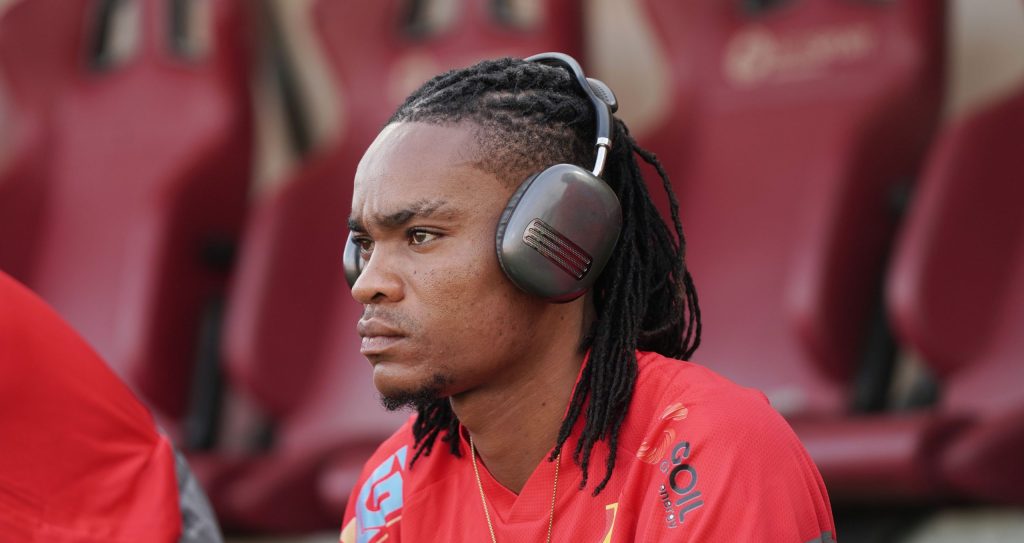
Simpson has also caught the eye this season through his stunning goals for Nations FC. Scroll down to watch some of Simpson’s best strikes.
🔥| 65’ GOOAL
RAZAK SIMPSON with a trademark strike to give us the lead. ☄️#AHOSC 🌈 – 🟠 #NFC | 0️⃣-1️⃣ pic.twitter.com/0esKFjuqF0
— Nations Football Club (@nationsfcgh) April 3, 2025
Don’t panic, there’s no looming power crisis
The Minister of Energy and Green Transitions, John Jinapor, has moved to allay public fears over a potential power crisis, assuring Ghanaians that the government is taking proactive steps to maintain a stable power supply.
Addressing concerns over reports that the country has just 2.6 days’ worth of fuel stock left for power generation on Citi Eyewitness News on Thursday, May 15, Jinapor clarified that while the figure is accurate, it does not signal an imminent crisis.
“On fuel stock, we did indicate to them that we have 2.6 days of fuel,” the Minister confirmed. “But I also did say that fortunately, the Ministry of Finance has supported us—we’ve procured 450,000 barrels of light crude oil arriving this weekend.”
Jinapor emphasised that the incoming supply will significantly boost Ghana’s fuel reserves and ensure the continued operation of thermal power plants.
He described the situation as under control, dismissing speculation of a looming nationwide power shortage.
“So, it is true that we have 2.6 days of stock, the good news is that we have 450,000 barrels coming in, so we shouldn’t panic. We will be okay. No—[there is no looming power crisis],” he assured.
Read also
Govt engages power sector leaders on sustainable energy solutions
Police officer who resigned to campaign for Mahama confirmed Akuapem North MCE
Police Detective Corporal John Evans Ayerakwa Kumordzie, who resigned from the Ghana Police Service in 2019 to campaign for President John Mahama, has been confirmed as the Municipal Chief Executive (MCE) for Akuapem North.
His confirmation follows President Mahama’s nomination of 33 individuals as Metropolitan, Municipal, and District Chief Executives (MMDCEs) for the Eastern Region.
Kumordzie secured 32 YES votes against 16 NO votes, representing 66.7% of the valid votes cast.
He previously resigned from the service and contested as the NDC Parliamentary Candidate in the Okere Constituency during the 2020 elections but lost to Dan Botwe.
Again, in 2024, Kumordzie, 40, relocated to the Akuapem North Constituency and contested but lost to NPP’s Sammy Awuku.
In 2019, he officially tendered his resignation letter to the then Inspector-General of Police (IGP), David Asante-Apeatu, in accordance with the Police Service Act.
Following his confirmation, the Eastern Regional Minister, Rita Akosua Awatey Adjei, administered the oath of office and secrecy.
Iranian Cultural Attaché visits National Theatre to deepen ties
By Patrick Ofoe Nudzi
Accra, May 15, GNA – Dr Amir Heshmati, Cultural Attaché of the Iranian Embassy, has paid a working visit to the National Theatre to explore cultural cooperation between Ghana and Iran.
He met with the Executive Director of the Theatre, Mr. Henry Malm, to discuss initiatives and collaborative programmes aimed at promoting cross-cultural understanding and mutual benefits.
Mr. Malm said the Theatre was committed to facilitating smooth cooperation between the two countries and creating opportunities for partnerships between Ghanaian and Iranian artists.
Resident groups, including the National Drama Company and the National Symphony Orchestra, showcased their talents to entertain the Cultural Attaché during the visit.
The National Theatre, established in 1992, aims to inspire artistic experiences, promote fiscal responsibility, and engage communities while broadening its audience base.
It also seeks to adopt technology to improve services, enhance communication, and develop modern theatre infrastructure.
GNA
KAS
Transparency needed on vice president’s health – NPP’s Masawudu to President Mahama
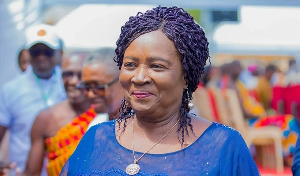 Prof Naana Jane Opoku-Agyemang has been away from the public on health grounds for weeks
Prof Naana Jane Opoku-Agyemang has been away from the public on health grounds for weeks
The Third National Vice Chairman of the New Patriotic Party (NPP), Alhaji Osman Masawudu, has called on President John Dramani Mahama to break his silence on the health status and whereabouts of Vice President Professor Naana Jane Opoku-Agyemang.
The NPP executive said Ghanaians deserve to be fully informed about the prolonged absence of the vice president from public view.
Alhaji Masawudu expressed concern over the growing speculation surrounding Professor Opoku-Agyemang’s health and criticised the National Democratic Congress (NDC) for failing to provide official updates.
He stressed that such silence fuels rumors and anxiety among the public, and urged the party’s leadership to come clean on the matter.
“Ghanaians deserve to know the health status of their vice President, the money spent on her medical bills, and her current whereabouts. There’s been no official update. Whether she is dead or alive, the people must be told,” he indicated.
In a metrotvonline.com report, Masawudu said transparency is a fundamental principle of good governance, and concealing vital information from the public erodes trust in the country’s leadership.
He argued that the Office of the Vice President is too significant to be shrouded in secrecy, especially in times of uncertainty.
The NPP stalwart further accused President Mahama, who was also the NDC’s 2024 flagbearer, of deliberately keeping Ghanaians in the dark.
He claimed that Mahama’s refusal to address the issue publicly is a disservice to the democratic process and disrespectful to the people.
Professor Naana Jane Opoku-Agyemang, Vice President of Ghana, has been on an extended medical leave, sparking concerns and speculations on social media and in political circles about what has happened to her.
It is, however, worth noting that on Mother’s Day, President John Mahama posted a photo with the vice president, stating that he had gone to visit her and that she was in high spirits, taking some rest before she resumes work.
MRA/AE
SML Ghana commemorates five years of downstream operations
Strategic Mobilisation Ghana Ltd. (SML) is marking five years of operations in the petroleum downstream sector with an expansion of its revenue assurance mandate into Ghana’s upstream petroleum and solid minerals sectors, building on a track record of digitising fuel audits and plugging revenue leakages in the downstream petroleum industry.
The company, which began in 2018 under a subcontract from the Ghana Revenue Authority (GRA), has helped close significant gaps in taxable petroleum product volumes, boosting government revenue and modernising oversight systems.
“Our story began with a bold vision: to support governments in safeguarding national revenue through end-to-end audit and revenue assurance services. Even at that early stage, our team demonstrated the value we could bring, combining precision, accountability, and technical expertise,” Director of Support Services at SML, Dr. Yaa Serwaa Sarpong, said in a keynote address when the company launched its upstream and solid minerals operations.
By 2019, SML had become a primary contractor for the GRA, and by 2020 had secured two five-year contracts for transaction audits and downstream petroleum monitoring — both approved by the Public Procurement Authority (PPA).
The company’s systems integrated data from the GRA, National Petroleum Authority (NPA), and petroleum depots to centralise oversight and improve tax collection.
Extant data shows that SML’s services have increased taxable monthly petroleum volumes from an average of 208 million litres to 450 million litres.
From May 2020 to December 2024, this translated into 14.1 billion litres in captured excess volume and more than GH¢20 billion in additional tax revenue. “The implication is that GRA can meet its annual target even before the deadline, whereas, prior to SML’s operations, GRA struggled to achieve this,” Dr. Sarpong said. The gains were sustained even during periods of economic disruption, including the COVID-19 pandemic.
The company’s technological systems replaced manual processes with real-time, tamper-proof monitoring infrastructure, which it says has improved compliance and accountability.
“This has improved compliance, eliminated errors, and strengthened controls to ensure every litre is fully accounted for,’ she added.
SML also highlighted its funding model as a differentiator, with Dr. Sarpong noting: “The SML business model is a full risk-reward structure where SML fully bears the full cost of investment, with no mobilisation from the government, unlike most government contracts.”
In October 2023, GRA consolidated all of SML’s audit services — including transaction, downstream, upstream audit, and solid minerals audit— under a single contract. That agreement was approved by the PPA in September.
“These sectors are now entering a new era of transparency and real-time oversight, thanks to the technological innovation and strategic thinking SML brings to the table. Today, SML stands at the forefront of an integrated, intelligent revenue monitoring solution, a first-of-its-kind innovative approach in Ghana’s extractive industries,” she remarked.
“This milestone is not just about systems and numbers; it’s about perseverance and a united vision for Ghana’s future. We wholeheartedly recommit ourselves to excellence, to innovation, and to the shared prosperity of our nation, Ghana,” she added.
The company has also signalled intent to expand beyond Ghana, positioning its model as a potential solution to illicit financial flows across Africa. “African countries lose about US$90 billion in illicit financial flows annually, according to the African Development Bank Group. SML is ready — with the expertise, the tools, track record and groundbreaking innovation — to support that continental transformation,” she said.
Duncan Amoah, Executive Secretary of the Chamber of Petroleum Consumers (COPEC), acknowledged his initial skepticism about SML. “In my line of work, you get all kinds of information from a broader spectrum. Last year, I happened to have been accosted by people I know, and then the agenda was, let’s discuss SML. At the time, I was not too charitable to this company.”
However, after visiting SML’s facilities, Amoah changed his perspective. Mr. Amoah pointed to even greater potential in upstream operations: “If the downstream is able to give us GH¢20 billion within 4 years, I can assure the upstream can do three times more,” he said. He urged political leaders to ensure that Ghana can verify reported production volumes from international companies.
Professor Douglas Boateng, a supply chain governance expert, described SML’s platform as “a generational innovation with the power to reshape how Africa governs, minimises revenue leakages, secures, and scales its industrial future.”
He stated that SML represents innovation by intention, determination and perseverance” as opposed to innovation by import. “According to selected global thought leaders, the SML’s fused platform, until the end of the third quarter of 2024, was the only known system in an emerging economy operating at scale with proven multi-site, real-time data capture functionality,” Professor Boateng stated.
He highlighted the platform’s potential beyond Ghana, envisioning a Ghanaian-built platform deployed across Zambia’s copper belts, Nigeria’s oil terminals, and Kenya’s utility corridors. SML’s model, which operates on a full risk-reward basis with no government mobilisation fees, sets it apart from conventional government contracts. “The SML business model is a full risk-reward structure where SML fully bears the full cost of investment, with no mobilisation from the government, unlike most government contracts,” Dr. Sarpong explained.
As it celebrates its fifth anniversary, SML has paid tribute to the many partners and institutions that have supported its journey. “This milestone is not just about systems and numbers; it’s about perseverance and a united vision for Ghana’s future. We wholeheartedly recommit ourselves to excellence, to innovation, and to the shared prosperity of our nation, Ghana,” Dr. Sarpong added.
Kwabena Kyere Duah, others named for planning and nomination committees
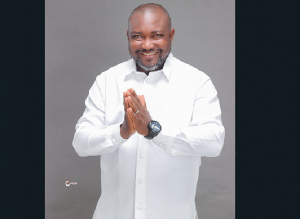 Dickson Kyere Duah has been appointed to chair the planning of the 50th anniversary of SWAG
Dickson Kyere Duah has been appointed to chair the planning of the 50th anniversary of SWAG
The Sports Writers Association of Ghana (SWAG) has named Dickson Kyere Duah, Member of Parliament for Berekum West, as the chairman of the planning committee of the 50th anniversary of the prestigious SWAG Awards and Miss Rosalind Amoh, Deputy Editor for the Daily Graphic also as the Chairperson of the SWAG Awards Nominations Committee.
These committees will play crucial roles in planning a memorable 50th anniversary of the prestigious SWAG Awards and identifying outstanding sports performers and organisations for honours.
In a statement issued and signed by Kwabena Yeboah, President of SWAG explained that the 50th SWAG Awards Planning Committee would oversee the planning of a grand commemoration and execution of the anniversary awards ceremony showcasing Ghana’s rich sports history, honoring legends and performers in the year under review, celebrating the country’s sporting history over the past five decades.
The SWAG Awards Committee would be chaired by Dickson Kyere Duah, Member of Parliament for Berekum West, who also doubles as the Bono/Ahafo Regional Vice Chairman of SWAG. He will be assisted by Kwadwo Baah Agyemang, former CEO of Ghana Digital Center, Maurice Quansah, Sports Editor of Graphic Communications Group Limited, and Rosemary Mbroba Gaisie formerly of the Ghana Broadcasting Corporation.
Others include Veronica Commey, Deputy Director General of the National Sports Authority, Sammy Heywood Okine, former SWAG General Secretary, William Dodzi Ezah, former SWAG General and editor at the Ghana News Agency, Kenneth Odeng Adade, Deputy General Secretary of SWAG, and Charles Kwadwo Ntim of Homebase Media as members.
The statement added that the SWAG Awards Nomination Committee will identify and nominate exceptional individuals and organisations in various sports categories for the prestigious SWAG Awards. They would also ensure a rigorous and transparent nomination process, upholding the highest standards of excellence in sports.
The committee will be chaired by Roslind Koramah Amoh, former Treasurer of SWAG and an editor at the Graphic Communications Group Limited with Kyei Baffour representing SWAG Western and Western North, Bright Yeboah Taylor, Sports Statistician and historian, Gabriel Obu, expert in least financed sports as members.
Other members of the committee include Matilda Dimedo, Women’s football, Francis Ofori from the SWAG Secretariat, Prince Obiba Ayim Poakwa, SWAG Greater Accra, Davis Attuquaye Clottey, SWAG Volta/Oti, Precious Sermevor, SWAG Bono/Ahafo, John Kwasi Arthur, SWAG Central, and Francis Okyere, SWAG Eastern.
“We are thrilled to announce these committees as we prepare to celebrate 50 years of the SWAG Awards. Their dedication and expertise will be instrumental in making this anniversary celebration a memorable one.
“The members of both committees bring a wealth of experience and knowledge in sports journalism, administration, and event planning. SWAG is confident that their collective efforts will result in a successful and impactful celebration,” SWAG President Kwabena Yeboah added.
Mali dissolves all political parties after opposition figures ‘arrested’
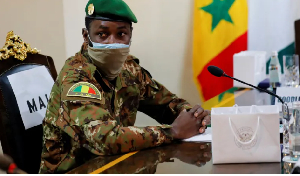 Colonel Assimi Goita, the leader of Mali, who seized power in 2020 and 2021
Colonel Assimi Goita, the leader of Mali, who seized power in 2020 and 2021
Mali’s military government has dissolved all political parties after accusations from rights groups that opposition figures have been arrested.
Assimi Goita, who seized power in two army coups in 2020 and 2021, validated the decision after it was broadcast to Malians in a televised statement on Tuesday.
The parties were disbanded after demonstrations this month, demanding the country returned to democratic rule.
Protesters gathered on May 3 and 4, carrying placards with slogans reading, “Down with dictatorship, long live democracy,” in a rare public rebuke of the military government, which had promised to hold elections in 2022.
A national conference held in April recommended extending Goita’s presidency until 2030, drawing condemnation from opposition figures and human rights groups.
In response to another protest that had been planned on Friday, the military government issued a decree suspending all political activities across the country.
The move forced opposition groups to cancel the demonstration, and the government has now tightened its grip further.
The clampdown has coincided with reports of disappearances of opposition figures. Human rights groups said several politicians have been forcibly disappeared in recent days.
On Thursday, Human Rights Watch (HRW) said Abba Alhassane, the secretary-general of the Convergence for the Development of Mali (CODEM), was “arrested” by “masked gunmen”.
That same day, El Bachir Thiam, the leader of the Yelema party, was reportedly seized by unidentified men in Kati, a town outside the capital.
On Tuesday, a CODEM member speaking on condition of anonymity told the Reuters news agency that the party had lost contact with Abdoul Karim Traore, a youth leader, and feared he too had been abducted.
Malian authorities have not commented on the reported arrests.
Goita first seized power in August 2020 amid escalating attacks from armed groups affiliated with ISIL (ISIS) and al-Qaeda’s regional affiliate Jama’at Nusrat al-Islam wal-Muslimin (JNIM).
In July 2020, protests against the former civilian government were violently repressed with at least 14 people killed during a crackdown by security forces.
The military then ousted the elected government, citing its failure to tackle the armed groups.
In December last year, HRW reported that Malian soldiers alongside Russian Wagner Group fighters “deliberately killed” at least 32 civilians and burned more than 100 homes in central and northern Mali.
Catherine Afeku to contest as NPP National Women Orgaiser
The former Member of Parliament for Evalue-Ajomoro-Gwira, Catherine Afeku, has officially declared her intention to contest for the position of National Women’s Organiser of the New Patriotic Party (NPP).
Speaking in an interview with Original FM on May 15, 2025, the staunch member of the NPP stated that she is currently awaiting the official opening of nominations to formally pick up nomination forms to enter the race.
“It is very true that I am contesting. The nominations are not officially open yet – So, this is just to make my intentions known. Some elders in the party (NPP) reached out to me to contest as an executive of the party back in 2008 but I wanted to be patient. So, I pleaded with them to take their time as I was inexperienced,” she said.
Catherine Afeku, who previously served as the Minister of Tourism, Culture and Creative Arts under the Akufo-Addo-led NPP government, is the latest prominent figure within the NPP to declare her intention to contest for the national executive position.
Her announcement follows a similar declaration by the Ashanti Regional Chairman of the NPP, Bernard Antwi Boasiako, popularly known as Chairman Wontumi, who recently announced his intention to run for the position of National Chairman of the party ahead of the 2028 general elections.
He explained that after deep spiritual reflection and engagement with God, he received divine confirmation to pursue the party’s national leadership role.
He further stated that once nominations are opened, he will formally submit his application to contest.
“I have sought guidance from God, asking for His support when the time comes for me to pick up nomination forms. I want the opportunity to serve the NPP and help secure victory in the 2028 elections. When the right time comes, I will pick up the forms and contest accordingly,” he said.
Watch the video below:
MAG/VPO
Watch as Paul Adom Otchere offers advice to NDC footsoldiers
UNDP holds 4th ‘Nimdie Series’ to empower MSMEs
The United Nations Development Programme (UNDP) has hosted the fourth edition of its ‘Nimdie Series’ in Accra, aimed at supporting the growth and sustainability of Micro, Small and Medium-sized Enterprises (MSMEs) in Ghana.
This year’s event, held on Wednesday, May 14, focused on the theme “Navigating the Regulatory Environment.”
The ‘Nimdie Series’ was introduced by UNDP to close the information gap facing MSMEs, equipping them with essential knowledge on how to grow and sustain their businesses, especially during challenging times. Previous editions have covered topics such as corporate governance, strategic communication, branding, and export readiness.
This latest edition specifically addressed regulatory compliance, helping MSMEs understand the legal and policy frameworks within which they operate.
Speaking at the event, Dr. Edward Ampratwum, Head of Inclusive Growth and Accountable Governance Cluster at UNDP Ghana, underscored the importance of MSMEs to the national economy.
“MSMEs, we understand, contribute strongly to the economy. They are mainly dominated by women and young people, and they are the engine of growth in Ghana,” he said.
Dr. Ampratwum highlighted UNDP’s commitment to inclusive development, stating, “It’s our mantra not to leave anyone behind. We are happy to invest in MSMEs to help sustain their businesses and create jobs.”
He announced the forthcoming launch of the UNDP’s Data Gateway, a digital platform designed to centralize key regulatory information for MSMEs. The platform, developed in collaboration with the Ghana Enterprise Agency (GEA), will also provide an online marketplace where MSMEs can promote their products and engage customers.
“We are moving the process to a digital space where MSMEs can continue to trade, access vital regulatory information, and contribute to economic transformation and sustainable development in Ghana,” Dr. Ampratwum said.
Mr. Charles Kusi Appiah Kubi, a Business and Investment Consultant at Corporate Integrity Consult, emphasized the importance of regulatory compliance for business success.
“Understanding and meeting regulatory requirements isn’t just a formality—it’s a game changer for accessing funds, building customer trust, and staying competitive,” he noted.
Participants at the event welcomed the opportunity to learn from regulators and interact with fellow business owners, expressing satisfaction with the practical insights and networking opportunities provided by the series.
Group files suit at Supreme Court to halt removal of suspended CJ
…..
Explore the world of impactful news with CitiNewsroom on WhatsApp!
Click on the link to join the Citi Newsroom channel for curated, meaningful stories tailored just for YOU:
https://whatsapp.com/channel/0029VaCYzPRAYlUPudDDe53x
No spam, just the stories that truly matter! #StayInformed #CitiNewsroom #CNRDigital
Govt engages power sector leaders on sustainable energy solutions
Finance Minister Dr. Cassiel Ato Forson has disclosed that he, along with Energy Minister Hon. John Abdulai Jinapor, held a frank and productive meeting with key stakeholders in Ghana’s power sector to chart a sustainable path forward.
The meeting brought together sector leaders from the Electricity Company of Ghana (ECG), Public Utilities Regulatory Commission (PURC), Volta River Authority (VRA), the Energy Commission, GRIDCo, and other institutions.
Discussions focused on the urgent need for effective, long-term solutions to the sector’s persistent challenges. These include legacy debts, tariff-related concerns, operational inefficiencies, and high-cost power purchase agreements.
Despite acknowledging the financial strain confronting the sector, Dr. Forson emphasised that the meeting’s primary focus was on identifying actionable steps to ensure stability and sustainability.
“Our conversation centred on the urgent need for effective and sustainable solutions to strengthen Ghana’s power sector,” he stated.
The meeting concluded with a strong, unified commitment from all parties to support ongoing reforms under the Energy Sector Recovery Programme (ESRP).
This includes prioritizing sustainable financial strategies and policy interventions aimed at improving operational efficiency and delivering reliable, affordable electricity to Ghanaians.
According to Dr. Forson, the goal is to not only stabilize the power sector but also to safeguard the broader economy from the ripple effects of inefficiencies in electricity delivery.
Group files suit at Supreme Court to halt removal of suspended CJ
‘I gave NPP 1 billion for 2015 Tamale congress’ – Chairman Wontumi
 NPP National Chairman hopeful Bernard Antwi Boasiako is the party’s Ashanti Regional Chairman
NPP National Chairman hopeful Bernard Antwi Boasiako is the party’s Ashanti Regional Chairman
The Ashanti Regional Chairman of the New Patriotic Party (NPP), Bernard Antwi Boasiako, popularly known as Chairman Wontumi, continues to make his case for the National Chairman position of the party.
The Ashanti Regional NPP chairman has stated that his decision to run for the national chairmanship is driven by his love for the party and his belief that he possesses the qualities to bring it back to power.
He said that he has demonstrated his love for the party by supporting the NPP with significant funds, even when he was the chairman for the Bosomtwi Constituency.
He disclosed that he supported the party’s 2015 National Congress, which was held in Tamale, with 1 billion.
Although Wontumi did not mention the currency denomination in his disclosure, the Ghana cedi was the country’s currency at the time of his donation.
“When I was the chairman for the Bosomtwi Constituency, I was sponsoring all the programmes of the youth wing of the party. Additionally, I was supporting the national leadership of the party with funds every month. Auntie Esther and others can attest to this.
“The love I have for this party is immense. I was supporting the national leadership of the party with money because we were in opposition. Even in 2015, after my constituency election, I gave all the remaining funds to the national leadership,” he said in the Twi dialect in an interview on Wontumi TV/Radio on May 15, 2025.
He added, “After my election, I gave them [GH¢] 1 billion to help organise the national congress in Tamale. This is something I have been doing; I’m a very selfless and loving person.”
The Ashanti Regional Chairman disclosed that he supported the party in all 16 regions of Ghana with a donation of [GH¢] 200,000 for the voter registration exercise for the 2020 general elections.
Watch his remarks in the video below:
#WontumiNews : “I supported the NPP with Ghc1billion in 2014 for the Tamale Congress.I’ve always been selfless and I promise to forge unity in the party ahead of the 2028 elections” -Chairman Wontumi pic.twitter.com/Qqw3NMSznF
— Wontumi Communications (@WontumiTV) May 15, 2025
BAI/GA
Watch as Paul Adom Otchere offers advice to NDC footsoldiers
Africa’s Queens Shine Bright, 15 Stunning Ambassadors Set to Conquer Miss World 2025 in India
Africa’s Queens Shine Bright, 15 Stunning Ambassadors Set to Conquer Miss World 2025 in India
News Hub Creator32min
Africa is stepping boldly onto the global stage as 15 captivating queens represent the continent at the prestigious Miss World 2025 pageant, set to take place in India. These powerful women, chosen from across Africa’s rich and diverse nations, embody more than just beauty — they bring talent, intelligence, purpose, and a deep sense of cultural pride to the competition. Among them is Ghana’s radiant representative, whose presence promises to make waves on the international scene.
Each of these queens carries a story that reflects the heartbeat of her homeland. From grassroots activism to academic excellence, they are living proof that pageantry has evolved into a platform for positive change. Their causes range from championing education and healthcare to promoting environmental sustainability and women’s empowerment. These are not just contestants; they are leaders ready to use their voices for impact.
The anticipation surrounding Miss World 2025 is higher than ever, especially with Africa’s growing influence in global beauty and fashion. The vibrant culture, heritage, and resilience of the continent will be on full display as the queens participate in talent showcases, head-to-head challenges, and purpose-driven initiatives. The world is watching — and Africa is ready to impress.
As the countdown begins, support is pouring in from across the continent and the diaspora. Fans are rallying behind their queens with pride, hope, and excitement. Whether they return with a crown or not, these 15 African beauties are already winners — shining symbols of a new generation of women who are bold, brilliant, and beautifully African.
Source
Namibia In Love With Bawumia’s Gold Anchor
Namibia is reportedly exploring the adoption of a gold-backed currency stabilisation programme, inspired by Ghana’s “Gold for Oil” initiative introduced by Dr. Mahamudu Bawumia during his tenure as Vice President.
The programme, which allowed Ghana to use domestically purchased gold to pay for oil imports, significantly reduced the country’s reliance on foreign exchange reserves and helped stabilise the Ghanaian cedi.
Dr. Bawumia, the flagbearer of the New Patriotic Party (NPP) in the 2024 elections, had proposed anchoring the cedi to gold, to ensure long-term exchange rate stability.
This approach not only addressed the depreciation of the cedi but also curbed fuel price volatility.
The success of this policy has garnered attention from other African nations facing similar economic challenges.
Namibia’s interest in this model reflects a growing trend among resource-rich African countries to leverage their natural assets for economic stability.
By considering a gold-backed currency approach, Namibia aims to strengthen its local currency and reduce dependency on volatile foreign exchange markets.
This move aligns with broader efforts across the continent to enhance financial sovereignty and resilience.
While Namibia has not officially announced the implementation of such a programme, the consideration itself underscores the influence of Ghana’s policy on regional economic strategies.
Leverage Artificial Intelligence to drive insurance efficiency – GIA President urges industry players
The President of the Ghana Insurers Association (GIA), Mr Seth Kobla Aklasi, has called on stakeholders in the insurance industry to adopt Artificial Intelligence (AI) as a catalyst for innovation and operational efficiency.
Speaking at the opening ceremony of GIA’s 3rd Annual International Educational Seminar in Accra, Mr Aklasi underscored the immense potential of AI in revolutionising insurance operations.
“AI-enabled tools can process claims in real time, especially in the medium to short term. Additionally, AI can assess accidents instantly and credit accounts immediately,” he said.
Mr Aklasi stressed the urgent need for the Ghanaian insurance industry to align with global trends and international best practices, highlighting innovation as key to resilience and competitiveness.
Running from 14th to 16th May 2025, the three-day seminar is themed: “Innovating Together – Building a Resilient Insurance Future.” It seeks to equip local practitioners with global insights while contributing to Ghana’s broader economic development.
The event has brought together leading insurers and reinsurers in Ghana, alongside experts in marketing, IT, corporate communications, economics, and management, to foster cross-disciplinary collaboration.
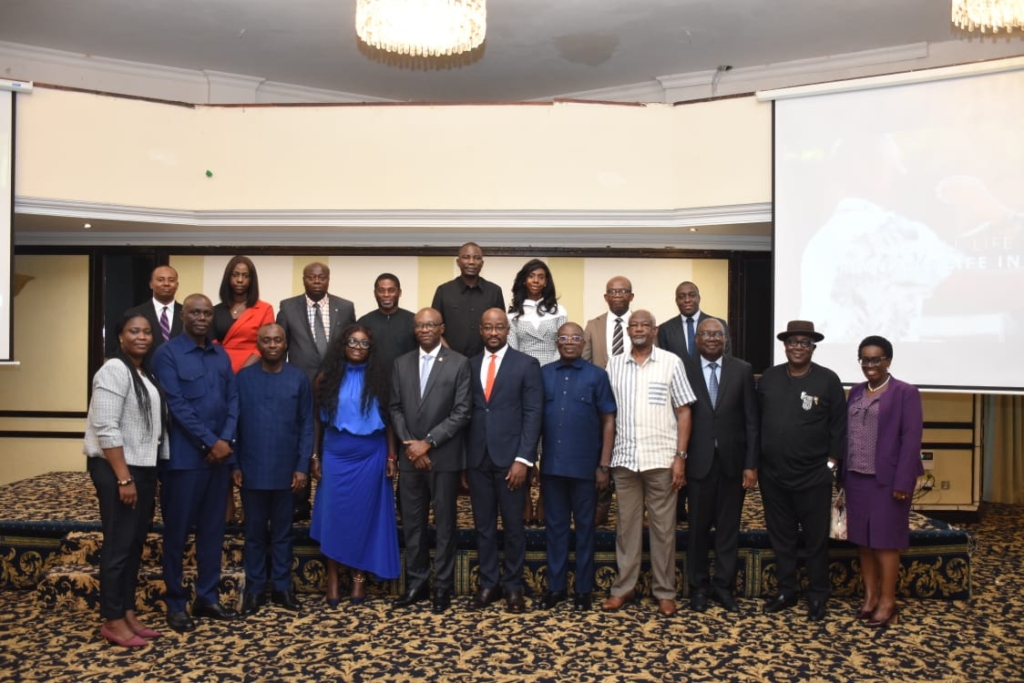
Also addressing the gathering, the Acting Deputy Commissioner of Insurance, Mr Bernard Ohemeng-Baah, reaffirmed the National Insurance Commission’s (NIC) support for the sector.
“The NIC will provide the enabling environment by listening, collaborating, and leading with industry captains. This partnership is crucial to driving innovation and efficiency within the insurance ecosystem,” he noted.
Sponsored by WAICA Re, the seminar will serve as a platform for capacity building, peer learning, and networking. Five expert discussants—including Mulenga Mutati, President of the Zambia Insurance Association—will lead key sessions.
In the area of life insurance, prominent speakers include:
- Nashiru Iddrisu (Hollard Life Insurance)
- Mrs Kakra Duffuor-Nyarko (Star Life Assurance)
- Maame Dufie Achampong-Kyei (Glico Life Insurance)
- Emmanuel Jonah (GN Reinsurance)
- Alfred Ludwig Kissiedu (Red Pear Communications)
Other featured speakers are Dr Kwaku Appietu-Ankrah (Ghana Re Plc), Mr Farris E. Attrickie (Priority Insurance), Mr Charles Graham-Mensah (Glico General Insurance), Mrs Freda Larbi (Enterprise Insurance), and Prof Patrick Assuming (University of Ghana).
DISCLAIMER: The Views, Comments, Opinions, Contributions and Statements made by Readers and Contributors on this platform do not necessarily represent the views or policy of Multimedia Group Limited.
DISCLAIMER: The Views, Comments, Opinions, Contributions and Statements made by Readers and Contributors on this platform do not necessarily represent the views or policy of Multimedia Group Limited.
I have nothing personal against Akufo Addo – Former Subin MP
<!– –>
<!–
(function(w, d) {
var s = d.createElement(‘script’);
s.src=”//cdn.adpushup.com/45999/adpushup.js”;
s.crossOrigin=’anonymous’;
s.type=”text/javascript”; s.async = true;
(d.getElementsByTagName(‘head’)[0] || d.getElementsByTagName(‘body’)[0]).appendChild(s);
w.adpushup = w.adpushup || {que:[]};
})(window, document);
–>


Compensate fraud victims – Lord Ibrahim urges financial sector
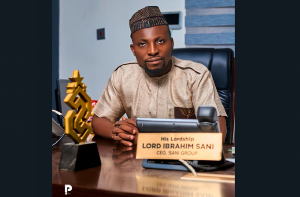 UK-based Ghanaian real estate and agriculture mogul, Lord Ibrahim Sani
UK-based Ghanaian real estate and agriculture mogul, Lord Ibrahim Sani
UK-based Ghanaian real estate and agriculture mogul, Lord Ibrahim Sani, is calling for sweeping reforms in Ghana’s financial sector, urging banks and mobile money operators to adopt a more consumer-protective stance by refunding clients who fall victim to fraud.
In an exclusive interview with the media, Lord Sani did not mince words as he addressed the recent wave of financial fraud incidents plaguing several commercial banks and mobile money operators across Ghana.
According to him, the onus should not be on the customer to bear the burden of losses resulting from sophisticated banking fraud, especially when such breaches are often due to systemic weaknesses within the institutions themselves.
“If someone gets defrauded due to gaps in a bank’s system, the bank should take full responsibility and refund the customer. That’s what happens in the UK, and Ghanaian lives are no less valuable,” he stated.
Ghana’s banking sector has recently come under intense public scrutiny following a series of fraudulent withdrawals, internal collusion scandals, and identity theft schemes that have led to thousands of cedis disappearing from unsuspecting customers’ accounts.
In several cases, clients have reported unauthorised transactions, only to be told by their banks that “investigations are ongoing”, with no timelines or guarantees of reimbursement. Many never see their money again.
Lord Sani believes this pattern reflects a dangerous culture of non-accountability and consumer neglect, worsened by poor regulatory enforcement and weak digital security infrastructure.
“In the western world and even China, if you’re defrauded, the bank takes immediate steps, from freezing the account, conducting forensic checks, and most importantly, compensating the victim,” he said. “Why can’t we replicate that here?”
Western worlds under the Financial Conduct Authority (FCA) and Payment Systems Regulator (PSR), banks are expected to reimburse customers defrauded by authorised push payment (APP) scams, provided the customers did not act with gross negligence. This policy has been credited with drastically reducing the rate of consumer losses and pushing financial institutions to invest more in fraud prevention.
“Banks in the Western world and even China understand the weight of trust placed on them. That’s why they take security seriously,” Lord Sani noted. “Ghanaian banks need to do the same, and our regulators must enforce it.”
He urged the Bank of Ghana and the Ghana Association of Banks to implement a mandatory reimbursement policy for verified fraud cases, backed by an independent consumer protection office. He also recommended the establishment of a national fraud reimbursement fund, jointly financed by banks and regulated by the state.
“Trust is the foundation of banking. If banks lose it, the entire financial system risks collapsing,” he said.
He has proposed that Parliament and the Bank of Ghana work together to introduce new laws, citing the UK’s Financial Services Compensation Scheme (FSCS) and Contingent Reimbursement Model Code as examples.
“We need a framework where the burden of proof is not unfairly placed on customers. Ghanaian banks make billions; they can insure and refund. Anything less is unacceptable,” he emphasised.
He added that trust in the banking system is at a tipping point. “If institutions fail to protect the people who entrust them with their money, confidence in the entire financial system will erode. Banking is a social contract. If you can’t protect my money or refund it when you fail, then you have broken that trust. It’s time we raise the bar.”
Bodaboda rider in court over alleged murder of his son
 A motorcycle taxi driver is in court over the alleged murder of his son | File Photo
A motorcycle taxi driver is in court over the alleged murder of his son | File Photo
A motorcycle taxi (bodaboda) rider, Joseph Muhulila, has been arraigned before the Iringa Resident Magistrate’s Court, facing charges of premeditated murder for allegedly killing his biological son, Timotheo Muhulila, aged 6.
Muhulila, 28, is accused of committing the heinous act on April 11, 2025, in Lukosi Street, Mkwawa Ward, within Iringa Municipality.
He made his first court appearance on Thursday May 15, 2025, before Resident Magistrate Rehema Mayagilo.
Senior State Attorney Radhia Njovu read the charges to the accused, stating that he committed the offense contrary to sections 196 and 197 of the Penal Code, Chapter 16, as amended in 2022.
Following the reading of the charges, the accused was not required to enter a plea, as the magistrate’s court lacks jurisdiction to hear murder cases, which are reserved for the High Court.
Under Tanzanian law, murder is a non-bailable offense. Consequently, Muhulila has been remanded in custody until the case comes up for mention on May 28, 2025.
Section 148(5)(a) of the Criminal Procedure Act, Chapter 20, explicitly denies bail for such capital offenses.
Fire and Rescue Force, demolished the toilet structure and successfully retrieved the body parts of the deceased child.
Earlier, a public statement released by the Iringa Regional Police revealed that Muhulila was arrested on suspicion of killing his son, dismembering the body, and dumping the remains into a pit latrine in an attempt to conceal the evidence.
According to the Iringa Regional Police Commander, Allan Bukumbi, the police, in collaboration with the Fire and Rescue Force, demolished the toilet structure and successfully retrieved the body parts of the deceased child.
Okraku Mantey Saw Himself as Lord Over Others After His Appointment – KOD
Presidential Advisor on Diaspora Affairs, Kofi Okyere Darko, popularly known as KOD, has called on political appointees to prioritize service over status, urging them to remain grounded and respectful to the citizens who empower their positions.
In a conversation on Rainbow Radio 92.4FM in the United Kingdom, KOD cautioned against the attitude of superiority some appointees assume once given the opportunity to serve. Without naming names directly at first, he pointed to the tendency of certain officials to see their appointments as an elevation above the very people they were called to serve.
“We are here to serve,” he stated. “My office is simply where I’ve been placed to perform that duty.”
He used the example of former Deputy Minister of Creative Arts, Mark Okraku Mantey, to highlight what he sees as a misplaced sense of importance among some former appointees.
“Mark Okraku Mantey was asked to serve, but he saw himself as a lord,” KOD said. “When you’re appointed, you should never consider yourself more important than those who voted your party into power. That’s where some politicians get it wrong.”
KOD, who has deep roots in public service through his family — his father being a former Director of Prisons and his mother a founding member of the 31st December Women’s Movement — emphasized that service should be the core mindset for anyone in public office.
“I moved up a notch because I’m now a director at the presidency,” he said. “But that doesn’t mean I should feel superior to my peers in the creative space. Having police escorts or people opening doors for you doesn’t make you better than Ghanaian voters. It just makes your work easier so you can serve them better.”
Although he disclosed that he had been advised not to directly respond to Mark Okraku Mantey, KOD made his opinion clear.
“The reason Mark is speaking now is because he failed to serve with humility. He saw himself as a lord,” he added. “But by God’s grace, some of us are in these roles now, and we understand what it means to truly serve. We won’t rule over the people — we will serve them.”
If NPP Officials Were Visiting EOCO, NIB and CID, They Wouldn’t Have Time to Hold Press Conferences – Nana Yaa Jantuah
A Presidential staffer, Nana Yaa Jantuah, has rubbished the New Patriotic Party (NPP’s) attacks on Ghana Gold Board (GoldBod) Chief Executive Officer (CEO), Sammy Gyamfi, as nonsensical and trivial.
In an interview on New Day on TV3, Jantuah, who is a former General Secretary of the Convention People’s Party (CPP), said the attacks reflect an abundance of free time on the hands of NPP politicians.
Kejetia, Central Market Queen Mothers call on Kumasi Mayor
Over 70 Queen Mothers from the Kejetia and Central Market on Thursday, May 15, paid a courtesy call on the Mayor of Kumasi, Hon. Richard Ofori-Agyeman Boadi. The delegation was led by Nana Yaa Fowaa (Oforiwaa), who also serves as the Yam Market Queen.
The purpose of the visit was to congratulate the Mayor on his appointment and to affirm their willingness to work closely with him to promote the interests of Asanteman.
In his response, Hon. Boadi expressed heartfelt appreciation for their visit and kind words. He assured them of his commitment to strengthening ties between the city administration and the market leadership.
On the issue of Kumasi City Market Ltd. (KCML), the Mayor disclosed that the outstanding utility bill owed to ECG has been reduced from GHS 3 million to GHS 1.5 million, with an agreement in place to pay the remaining amount in instalments.
He urged all traders to ensure prompt payment of bills, taxes, and levies to support the development of the facility and fulfil obligations to the state and its institutions.
As a sign of commitment to improving market operations, the kitchen facility at the market has been provided with three water tanks to ensure a consistent water supply.
The Mayor also noted that when a new board is constituted, one of its priorities will be securing insurance coverage for the facility to provide some level of protection for traders. He further assured the Queen Mothers that issues such as obstructed access routes and unauthorised containers within the market will be addressed to allow for emergency access and smoother operations.
He further assured the Queen Mothers that issues such as obstructed access routes and unauthorised containers within the market will be addressed to allow for emergency access and smoother operations.
Finally, Hon. Boadi reiterated the unwavering commitment of H.E. John Dramani Mahama to the completion of Phase II of the market project. He emphasised that this initiative will ease congestion, boost commercial activity, and restore confidence in Kumasi’s business environment.
Go And Sin No More Sammy; But Is There A New Clearing Agent On The Block, Or Is This Much Ado About Nothing?
The Presidency has spoken through the Minister for Government Communications, Felix Kwakye Ofosu, and the dust storm around Sammy Gyamfi’s generosity saga has settled. A public apology there, a gentle caution here and suddenly, Ghana’s hottest political ‘Cantata’ ends not with a resignation, as some people greatly anticipated but with a presidential pardon.
Register your excavator in two weeks or risk losing it – DVLA warns
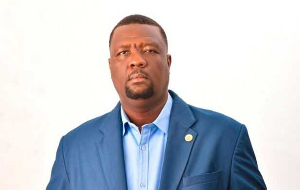 DVLA CEO, Julius Neequaye Kotey
DVLA CEO, Julius Neequaye Kotey
The Driver and Vehicle Licensing Authority (DVLA) has directed all dealers and individuals who own excavators to register their equipment within two weeks or risk losing them.
Speaking at a press conference in Accra on Wednesday, May 14, 2025, the Chief Executive Officer of DVLA, Julius Neequaye Kotey, stated that his outfit would arrest owners of unregistered excavators.
“Every excavator operator out there has two weeks to register their excavator. Many of the machines found on site were not registered, which the DVLA considers disrespectful and a violation of the law,” he said.
“We are not going to allow this to continue. After the two weeks, we along with the police will move in to either arrest the owners or seize the excavators,” Kotey stated.
The move aims to curb illegal mining activities across the country.
SA/MA
Watch the latest edition of BizTech below:
Click here to follow the GhanaWeb Business WhatsApp channel
Meanwhile, watch GhanaWeb’s tour of Odweanoma Paragliding Field below:
Goddess Braids with Curls: A Regal Fusion of Texture and Elegance
Goddess braids with curls are a modern, majestic take on traditional braiding styles. Combining the sculpted precision of thick, raised cornrows with the softness of flowing curls, this style exudes both power and femininity. While traditionally worn by women, it’s increasingly being embraced by men who appreciate its intricate detailing and expressive flair.
Ghana needs enforceable ethics law, not just guidelines – Elvis Darko
Editor of the NewsCenta newspaper, Elvis Darko, has called on President John Dramani Mahama to take decisive steps toward institutionalising ethical governance by ensuring the long-awaited Code of Conduct for public officers is passed into law.
His remarks follow President Mahama’s recent decision not to pursue further disciplinary action against the acting CEO of the Ghana Gold Board, Sammy Gyamfi, after a viral video showed him handing over an undisclosed amount of U.S. dollars to evangelist Patricia Asiedua Asiamah, popularly known as Nana Agradaa.
Speaking on Channel One TV’s Breakfast Daily on Thursday, May 15, Mr. Darko acknowledged the President’s efforts to instill accountability among public appointees, but warned that such initiatives could fall short without enforceable legislation.
“The president has shown a commitment to making appointees behave in a certain manner, but I think if we leave it in the realm of a Code of Conduct, which is not enforceable because it is a government policy, it could backfire,” he stated.
He emphasised that without legal authority, repeated misconduct by public officials could harm the administration’s image and erode public trust.
“If the president is not careful and his appointees begin to misbehave, and then the action that the president will take also becomes a source of controversy, the government will risk losing public trust,” he cautioned.
Elvis Darko, therefore, urged President Mahama to move beyond reliance on non-binding codes and activate the legislative process to pass the Conduct of Public Officers Bill, which has long been pending at the Attorney General’s Department.
“I will urge President Mahama that instead of this code, which is not backed by law, the best thing is to send the bill to Parliament to be passed. Whatever credibility deficit that could affect him if this continues for a long time, this bill can help prevent it,” he said.
Group files suit at Supreme Court to halt removal of suspended CJ
‘I gave NPP 1 billion for 2015 Tamale congress’ – Chairman Wontumi
The Ashanti Regional Chairman of the New Patriotic Party (NPP), Bernard Antwi Boasiako, popularly known as Chairman Wontumi, continues to make his case for the National Chairman position of the party.
The Ashanti Regional NPP chairman has stated that his decision to run for the national chairmanship is driven by his love for the party and his belief that he possesses the qualities to bring it back to power.
He said that he has demonstrated his love for the party by supporting the NPP with significant funds, even when he was the chairman for the Bosomtwi Constituency.
He disclosed that he supported the party’s 2015 National Congress, which was held in Tamale, with 1 billion.
Although Wontumi did not mention the currency denomination in his disclosure, the Ghana cedi was the country’s currency at the time of his donation.
“When I was the chairman for the Bosomtwi Constituency, I was sponsoring all the programmes of the youth wing of the party. Additionally, I was supporting the national leadership of the party with funds every month. Auntie Esther and others can attest to this.
“The love I have for this party is immense. I was supporting the national leadership of the party with money because we were in opposition. Even in 2015, after my constituency election, I gave all the remaining funds to the national leadership,” he said in the Twi dialect in an interview on Wontumi TV/Radio on May 15, 2025.
He added, “After my election, I gave them [GH¢] 1 billion to help organise the national congress in Tamale. This is something I have been doing; I’m a very selfless and loving person.”
The Ashanti Regional Chairman disclosed that he supported the party in all 16 regions of Ghana with a donation of [GH¢] 200,000 for the voter registration exercise for the 2020 general elections.
Watch his remarks in the video below:
#WontumiNews : “I supported the NPP with Ghc1billion in 2014 for the Tamale Congress.I’ve always been selfless and I promise to forge unity in the party ahead of the 2028 elections” -Chairman Wontumi pic.twitter.com/Qqw3NMSznF
— Wontumi Communications (@WontumiTV)
May 15, 2025
BAI/GA
Watch as Paul Adom Otchere offers advice to NDC footsoldiers
Ghana is strategically positioned to manufacture vaccines
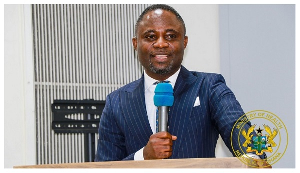 Kwabena Mintah Akandoh, Minister of Health
Kwabena Mintah Akandoh, Minister of Health
Ghana is strategically positioned now to manufacture its own vaccines, Health Minister Kwabena Mintah Akandoh has disclosed.
He said Ghana had established the National Vaccine Institute; hence, the nation was well-placed to produce its own vaccines.
Moreover, other leading pharmaceutical companies in the country had also taken the lead in that respect.
Mr. Akandoh made the disclosure at a press conference at the Presidency in Accra, during a courtesy call on President John Dramani Mahama by Dr Jean Kaseya, Director-General, Africa Centers for Disease Control and Prevention (Africa-CDC).
The Africa-CDC Director-General is in the country to sign a data-sharing agreement between Ghana and Africa-CDC.
Mr Akandoh said: “As we all recall during the pandemic, we have countries who looked into our eyes and told us that, look, not until they satisfy their citizens, they were not going to allow the export of vaccines into our country, and therefore I think that we must learn lessons from that to be able to prepare adequately for any future pandemic”.
“We also think that we should be able to build or scale up our primary health care services as we roll out the free primary health care.”
He said the Mahama Cares also needs some kind of collaboration for its sustainability, and it could also be an innovation that could also be emulated by other African countries.
He said the resource support from other partner donors or development partners were dwindling.
“We all know that we have been signaled that by the year 2030, we’ll be exiting Gavi, and therefore, there is a need for us to find a sustainable way of financing our vaccines in this country.
This, he said, was one of the ways they could collaborate well with Africa-CDC to ensure that they had sustainable sources of funding for their vaccines, saying “and if we do, then other countries can also emulate the same”.
Mr Akandoh said Dr Kaseya’s visit to Ghana and the objectives of the Africa-CDC aligned very well with one of the priorities of the President by putting in place robust mechanism to have robust healthcare system to be able to respond promptly to pandemics and to ensure that we have health security in this country.
He said as a country, they had collaborated so well with Africa-CDC and that they had enjoyed some support from Africa-CDC for some time now.
Highlighting on that, Mr Akandoh said Ghana had enjoyed about $2.4 million to strengthen its primary healthcare system.
He said they were at the moment training or had trained about 400 epidemiologists through the Africa-CDC’s assistance.
He said they raised not less than $400,000 to train such people.
He said the Africa-CDC had also assisted Ghana to raise not less than $1.6 million for the procurement and delivery of coaching and IT equipment as a country.
Mr Akandoh said by the grace of God, Ghana was playing a vital role in terms of health in Africa.
He said the School of Public Health at the University of Ghana was currently serving as the sub-regional center for training epidemiologists.
Mr Akandoh said the Food and Drugs Authority (FDA) was also at the maturity level for what was playing a vital role in promoting continental health security.
He said the National Health Insurance Scheme (NHIS) was one of the strongest health financing schemes within the sub-region, declaring that “other countries are also learning from us”.
“We are leading by example, not only the National Health Insurance Scheme, but at the moment, as you all know, it is His Excellency John Dramani Mahama’s priority area to roll out what we call the Free Primary Healthcare, which we believe that that will catalyze or be a catalyst to arriving at the Universal Health Coverage on time,” the Minister said.
He also mentioned the Mahama Cares (Ghana Medical Trust Fund), which was set-up by the Government as part of efforts to relieve the financial burden of sufferers of chronic diseases (Non-communicable Diseases).
Dr Jean Kaseya, Director-General, Africa Centres for Disease Control and Prevention (Africa-CDC), lauded President John Dramani Mahama’s visionary leadership in transforming Ghana’s health sector.
“I’m so impressed, so impressed by President Mahama. This is why I told him I would come to visit you in Ghana, and I want you, the media, to say that someone who came from the African Union, someone who is the leader of health in Africa, is impressed by what Ghana is doing,” Dr Kaseya said.
He underscored the African Union and the Africa-CDC’s commitment to support Ghana and to share the good news and experiences.
Watch as Paul Adom Otchere offers advice to NDC footsoldiers below:
Bank of Ghana says cash withdrawals in foreign currency from accounts allowed
$100 million digital learning project launched to bridge education gap in Ghana
 The initiative seeks to bridge the educational gap between rural and urban schools | File Photo
The initiative seeks to bridge the educational gap between rural and urban schools | File Photo
A $100 million digital learning project aimed at improving the quality of teaching and learning in Senior High Schools across Ghana has been launched at the Awudome Senior High School (AWUSCO) in the Volta Region.
The initiative seeks to bridge the educational gap between rural and urban schools by providing access to modern digital tools and internet connectivity.
The project, which is a collaboration between the National Council of Parent-Teacher Associations (NCPTA) and Celltel Networks, will supply students with Android phones, tablets, and laptops, which parents can purchase through flexible payment plans spanning one to three years.
Teachers, on the other hand, will benefit from a longer payment period of up to five years to acquire the devices.
According to an adomonline.com report, as part of the initiative, Celltel Networks will provide free internet connectivity to participating schools, ensuring both teachers and students can access digital learning resources.
The project is expected to significantly improve access to information and promote effective teaching and learning in under-resourced areas.
Speaking at the national launch, NCPTA President, Christian Aikins Atsu, described the project as a major step in the council’s collaboration with the government to promote quality education.
He reiterated the NCPTA’s commitment to creating a conducive environment for academic excellence and student development.
Atsu highlighted the vital role parents play in supporting education and praised the government for recognising this partnership.
He encouraged parents to take advantage of the flexible payment options to equip their children with the necessary digital tools for learning.
“I am encouraging all parents to take advantage and make good use of the flexible payment options so that your children will be equipped with the necessary tools for learning”, the report stated.
Director of Celltel Networks, Dr Prince Kofi Kludjeson, reaffirmed his company’s dedication to closing the digital divide in Ghana.
He stressed on the importance of technology in driving national development and urged churches and community leaders to promote ICT education among their members to keep pace with global trends.
The Headmaster of AWUSCO, Courage Meteku, expressed gratitude for the initiative, noting that his school has already been connected to the internet.
He said the digital access has opened new educational opportunities and expressed confidence that the project will further boost the school’s strong academic performance.
“Digital access has opened new educational opportunities. I have confidence that the project will boost the school’s strong academic performance,” the report indicated.
MRA/AE
Nigeria completes $3.4 billion IMF loan repayment, exits debtor list
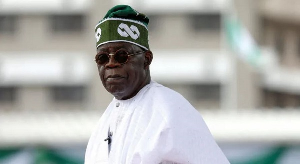 Bola Tinubu is Nigeria’s President
Bola Tinubu is Nigeria’s President
Nigeria has officially cleared its $3.4 billion emergency loan from the International Monetary Fund (IMF) joining a select group of nations free from IMF debt.
The repayment, completed ahead of schedule on April 30, 2025, highlights Nigeria’s commitment to fiscal responsibility and is seen as a major step toward strengthening global investor confidence.
The loan secured in April 2020 under the IMF’s Rapid Financing Instrument, provided critical support during the economic challenges of the COVID-19 pandemic.
With the principal now fully repaid, Nigeria will continue making annual payments of approximately $30 million in Special Drawing Rights (SDR) charges until 2029.
This milestone has led to Nigeria’s removal from the IMF’s list of debtor nations, a development expected to boost the country’s position in negotiations with global financial institutions and investors.
However, despite this achievement, Nigeria still faces considerable economic hurdles, including a total external debt of $44.9 billion as of December 2024.
SP/SA
Watch the latest edition of BizTech below:
Click here to follow the GhanaWeb Business WhatsApp channel
Watch scenes from the opening ceremony of the 2025 Western Region Inter-Schools event
 The trophies (in gold colour) will be awarded to winners of the athletics meet
The trophies (in gold colour) will be awarded to winners of the athletics meet
The 23rd Annual Inter-Schools and Colleges athletics meet is underway in the Western Region, specifically in Sekondi, from May 15 to 16, 2025.
The participating schools competing for honors include Adiembra Senior High School, Ahantaman Girls Senior High School, Diabene Senior High Technical School, Fijai Senior High School, Sekondi Senior High School, Shama Senior High School, St. John’s School, Daboase Senior High School, and Methodist Senior High School.
The students representing the various schools gathered for a parade, where the defending champions returned the trophy to pave the way for the new edition.
The school authorities announced the rules governing the event to the students and urged them to comply to ensure a fair and chaos-free competition.
The Sekondi athletics meet, which is being covered by GhanaWeb Sports, will feature events like 800m, High Jump, Long Jump, 4×100, 200m, Discus, 5000m, 400m, and others.
The athletes who excel at the regional level will get the opportunity to compete at the national stage.
Watch scenes from the opening ceremony of the 2025 Western Region Inter-Schools event
SB/EB
Drone attacks raise stakes in new phase of Sudan’s civil war
Paramilitary fighters appear to have opened a new phase in Sudan’s civil war after being driven from the capital, in a move which some experts have described as a “shock and awe campaign”.
Just weeks after the army celebrated the recapture of Khartoum, its foe the Rapid Support Forces (RSF) launched a series of unprecedented drone strikes on Port Sudan in the east of the country.
The attacks have led to worsening power blackouts, as well as city residents facing water shortages.
“It’s a level of power projection within this region that we haven’t seen yet,” says Alan Boswell, the Horn of Africa expert for the International Crisis Group.
“I think it raises the stakes quite a bit,” he added.
The barrage of attacks on the war-time capital and humanitarian hub signals that the RSF is determined and able to carry on the fight despite significant territorial losses.
And it has showcased the growth of advanced drone warfare in Africa.
Drones have played an increasing role in the conflict, which has entered its third year.
The war began as a power struggle between the Sudanese Armed Forces (SAF) and the RSF and has drawn in other Sudanese armed groups and foreign backers, plunging the country into what the UN calls the world’s worst humanitarian crisis.
Unmanned aerial vehicles (UAVs) helped the army advance earlier this year. And the RSF escalated its own use of drones as it was pushed out of central Sudan, especially Khartoum, back towards its traditional stronghold in the west of the country.
In recent months the paramilitaries had stepped up drone strikes on critical civilian infrastructure in army-controlled areas. That continued on Wednesday night with attacks on three power stations in the city of Omdurman, which lies across the Nile River from Khartoum. The damage has caused widespread electricity outages in the capital region.
But it was the RSF’s sustained strikes on Port Sudan, until now seen as a safe haven home to government officials, diplomats and humanitarian organisations, that underlined a shift in strategy to a greater emphasis on remote warfare, and aimed to demonstrate strength.
“The RSF is trying to show that they don’t need to reach Port Sudan by land in order to be able to have an impact there,” says Sudanese political analyst Kholood Khair.
The group is trying to achieve a “narrative shift” away from “the triumphant SAF that took over Khartoum,” she says.
“It is saying to the Sudanese Armed Forces: ‘You can take Khartoum back, but you’ll never be able to govern it. You can have Port Sudan, but you won’t be able to govern it, because we will cause a security crisis for you so large that it will be ungovernable’… They want to unequivocally show that the war is not over until they say so.”
The paramilitary group has not directly addressed the Port Sudan drone attacks. Rather, it has repeated its assertion that the SAF is supported by Iran and accused the armed forces of targeting civilian infrastructure and state institutions, calling the military strikes on Khartoum and RSF-held areas in the west and south of the country war crimes.
Both sides stand accused of war crimes which they have denied, but the RSF has been singled out over allegations of mass rape and genocide.
The change in its tactics may have been triggered by battlefield necessity, but is possible because of technological advancement.
The RSF had previously used what are known as suicide or loitering drones, small UAVs with explosive payloads that are designed to crash into targets and can carry out coordinated attacks.
It seems to have deployed this method in Port Sudan, with the commander of the Red Sea Military Zone Mahjoub Bushra describing a swarm of 11 Kamikaze drones in the first strike on a military airbase.
He said the army shot them down, but they turned out to be a tactical distraction to divert attention from a single strategic drone that successfully struck the base.
The make of this drone is not clear. But satellite images reported by Yale researchers and the Reuters news agency have shown advanced UAVs at an airport in South Darfur since the beginning of the year.
The defence intelligence company Janes has determined them to most likely be sophisticated Chinese manufactured CH-95s, capable of long-range strikes.
Jeremy Binnie, an Africa and Middle East analyst at Jane’s, told the BBC that photos of what appear to be the remnants of the smaller kamikaze drones suggest they are probably a different version than the RSF had used before, and might be better at penetrating air defences because of their shape.
One regional observer suggested the RSF had been able to breach the SAF’s anti-drone technology with signal jammers attached to the drones, but cautioned this was still unproven.
The South Darfur airport in Nyala, the presumptive capital and military base of the Rapid Support Forces, has been repeatedly bombed by the SAF, which destroyed an aircraft there earlier this month.
Some experts see the RSF’s bombardment of Port Sudan at least partly as retaliation.
The escalating drone warfare has again highlighted the role of foreign actors in Sudan’s civil conflict.
“This is a war of technology,” says Justin Lynch, managing director at Conflict Insights Group, a data analytics and research organisation.
“That’s why the foreign supporters are so important, because it’s not like the RSF is making the weapons themselves. They’re being given this stuff.”
The army has accused the United Arab Emirates (UAE) of supplying the paramilitary fighters with the drones, and cut diplomatic ties with Abu Dhabi because of the attacks.
The UAE has strongly rejected the charges. It has long denied reports from UN experts, US politicians and international organisations that it is providing weaponry to the RSF.
But Mr Lynch says the evidence is overwhelming.
He was the lead author of a US State Department-funded report late last year that concluded with “near certainty” the the UAE was facilitating weapons to the RSF by monitoring imagery and flight patterns of airlines previously implicated in violating a UN arms embargo.
He told the BBC it would be surprising if the Emiratis were not helping deliver the drones used in the Port Sudan attacks.
He also determined with similar near-certainty that the Iranians were supplying weapons to the SAF, and he helped authenticate documents provided to the Washington Post that detail the sale of drones and warheads to the army by a Turkish defence firm.
Iran has not responded to the allegations. Turkish officials have denied involvement.
The increasing use of drones by both sides may be redefining the war, but it is the ability of the RSF to strike strategic targets hundreds of kilometres from its positions that has rattled the region.
Over a week of daily attacks on Port Sudan, the paramilitaries hit the country’s only working international airport, a power station, several fuel depots, and the air base, apparently trying to disrupt the army’s supply lines.
The city is also the main entry port for relief supplies and the UN has warned that this “major escalation” could further complicate aid operations in the country and lead to large-scale civilian casualties.
“This was such a shock and awe campaign that it has not only stunned SAF, I think it’s also stunned Egypt, Saudi Arabia, others who were behind SAF, and remakes the entire war,” says Mr Boswell, adding that it closing the gap in air power between the RSF and the army.
“The RSF is widely viewed as a non-state actor,” he says “and normally, groups like that can muster quite a bit of an insurgent force. But the government with the air force is the one that always has the aerial capacity, and this just turns all those old adages on its head.”
The development has triggered comparisons to the long-range drone warfare between Russia and Ukraine.
“These weapons have more precision, you don’t need a manned aircraft any more, and they are much more affordable than operating sophisticated jets,” says Mr Binnie.
“This is part of a broader trend in technological proliferation where you can see what used to be really high-end capabilities being used in a civil war in sub-Saharan Africa.”
The Sudanese foreign ministry has warned that the attacks threaten regional security and the safety of navigation in the Red Sea, calling on international actors to take “effective action against the regional sponsor of the militia,” a reference to the UAE.
Mr Lynch believes that only an agreement between the UAE and the Sudanese army will end the war.
“This war is always evolving, always changing,” he says, “but you’ll see it will continue for years and decades unless there is serious diplomatic action to stop it.”
